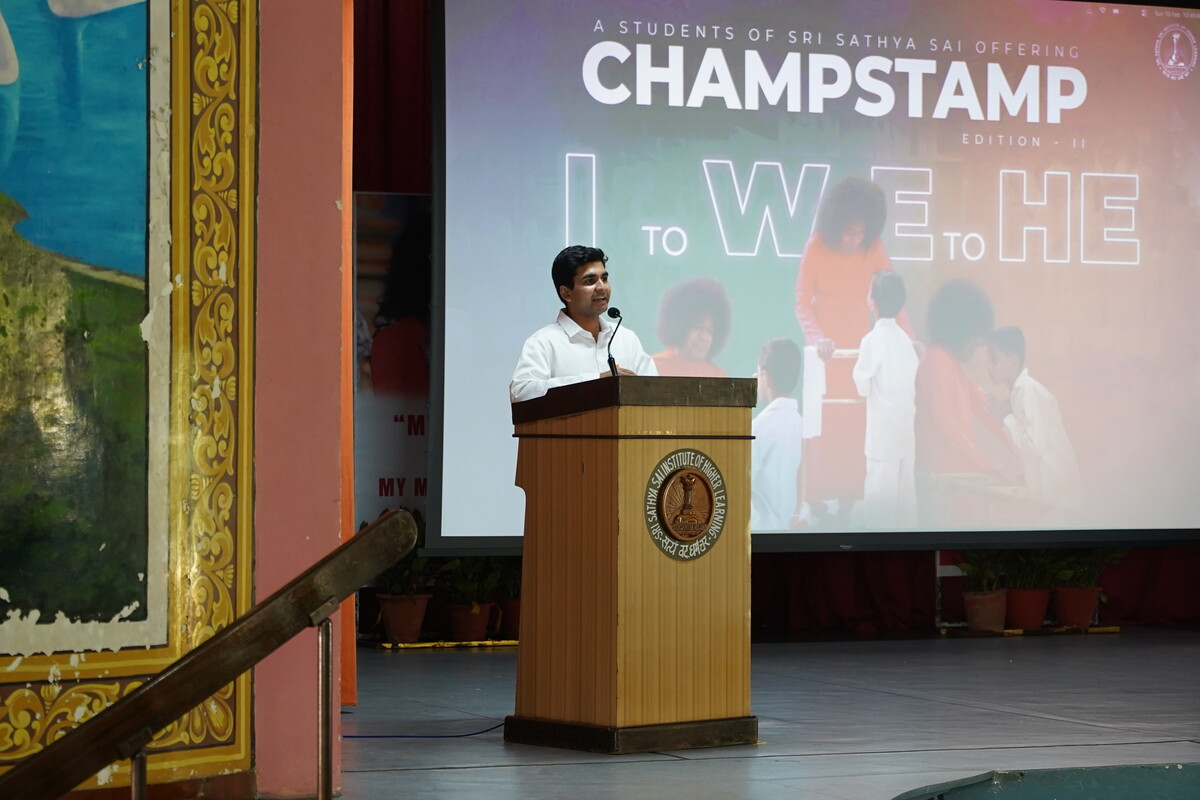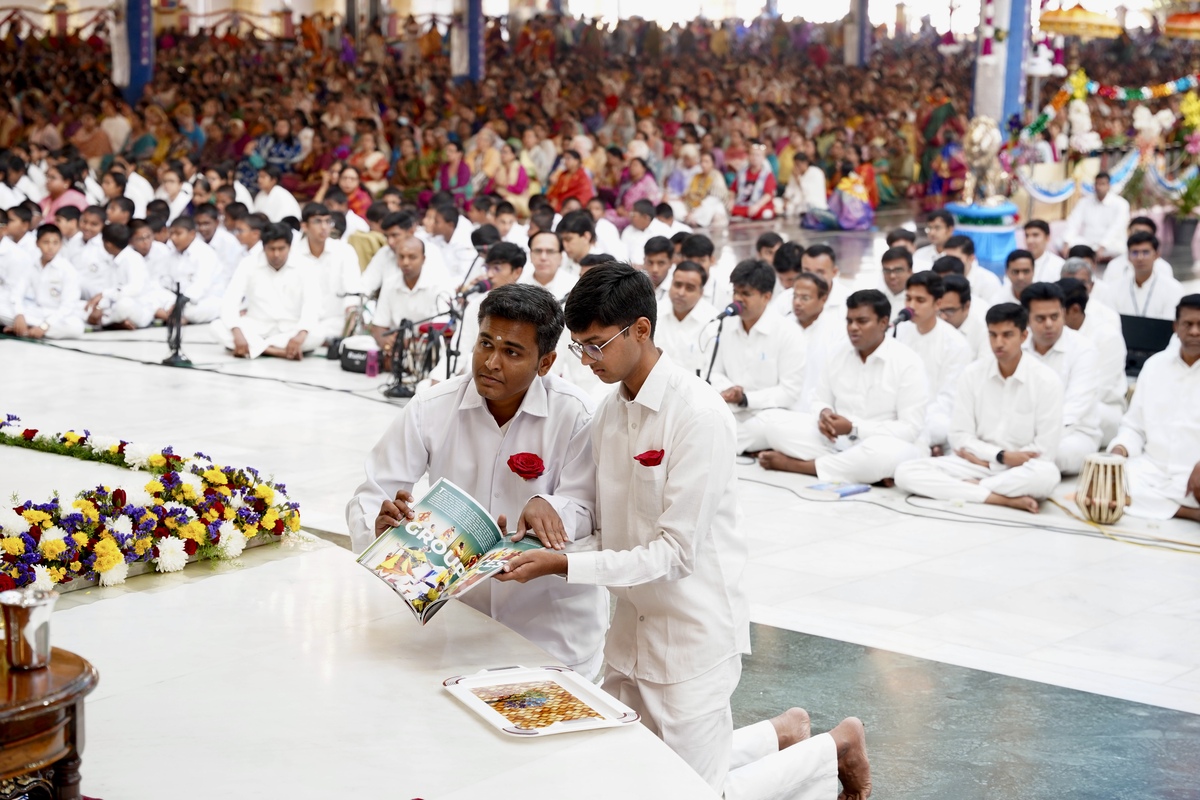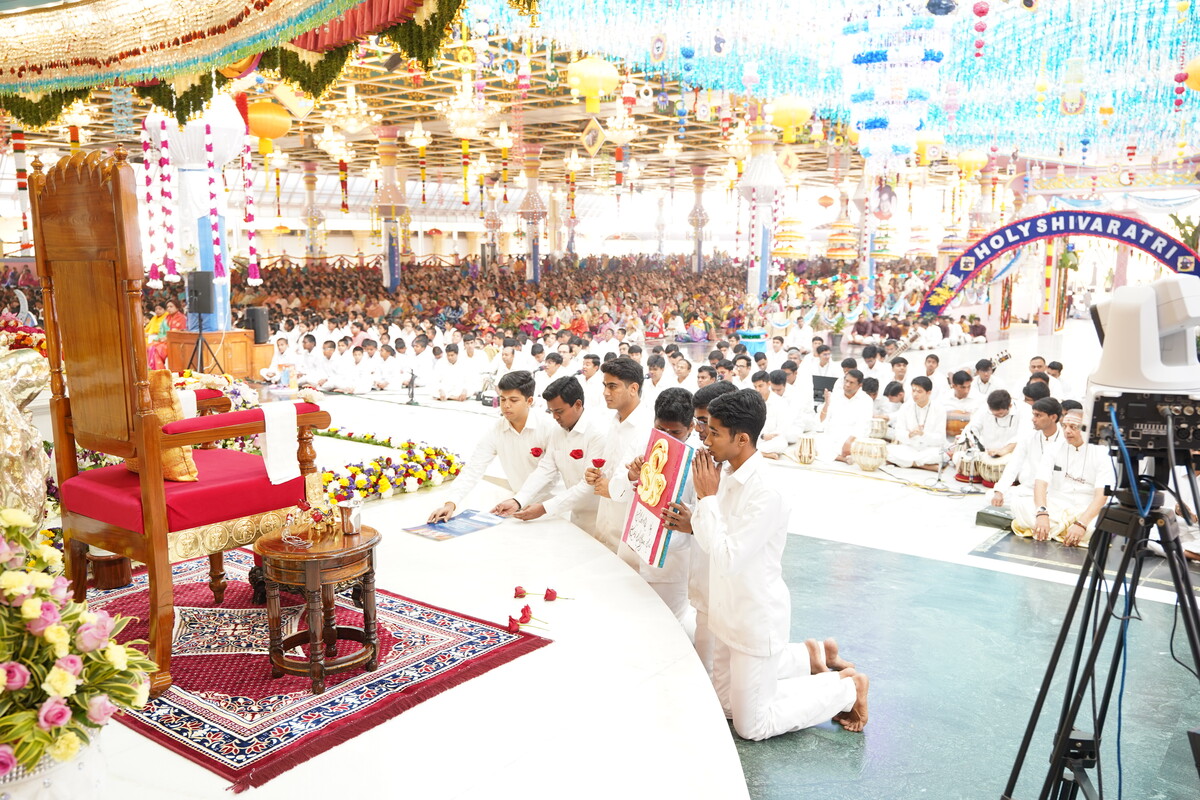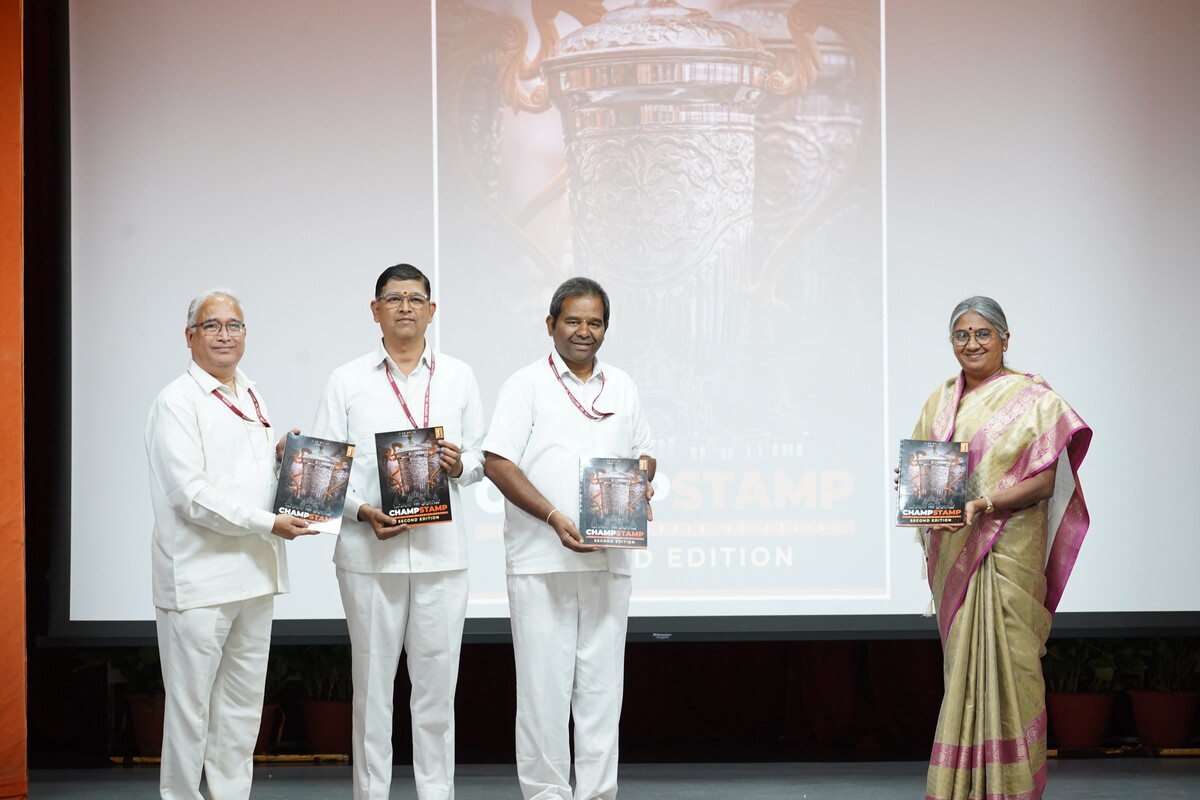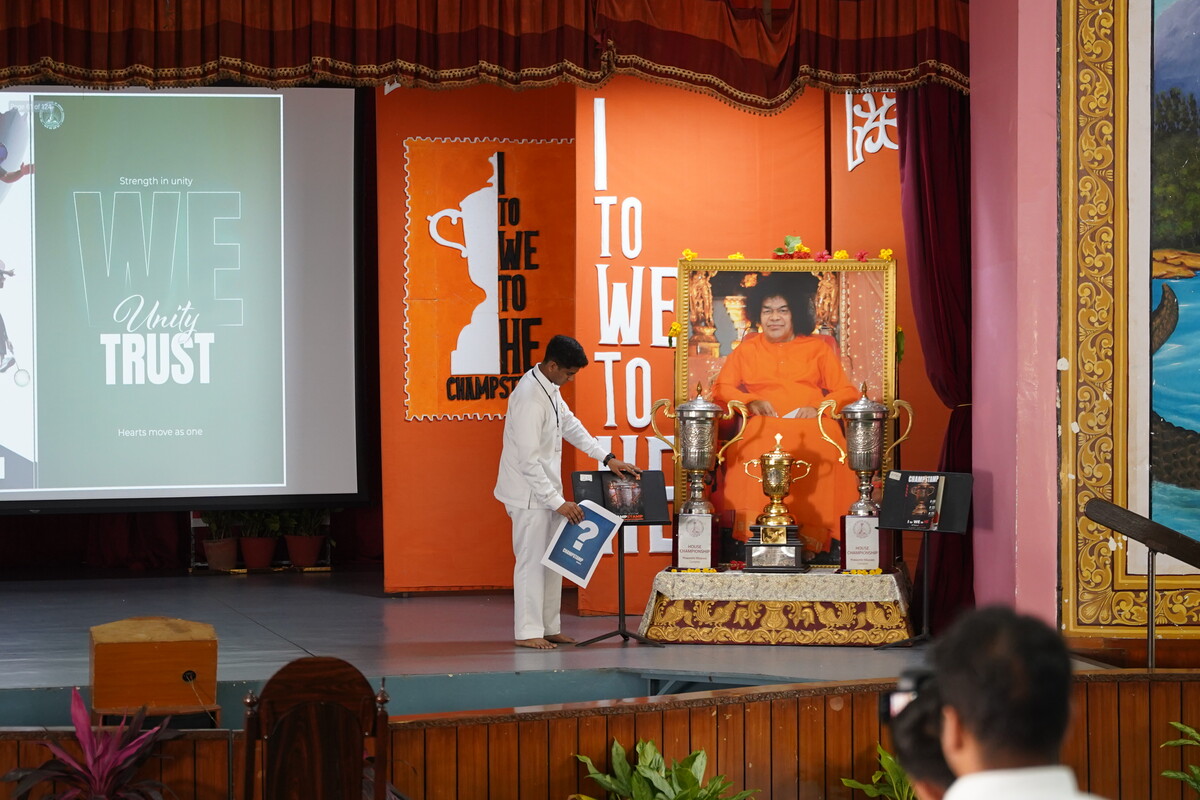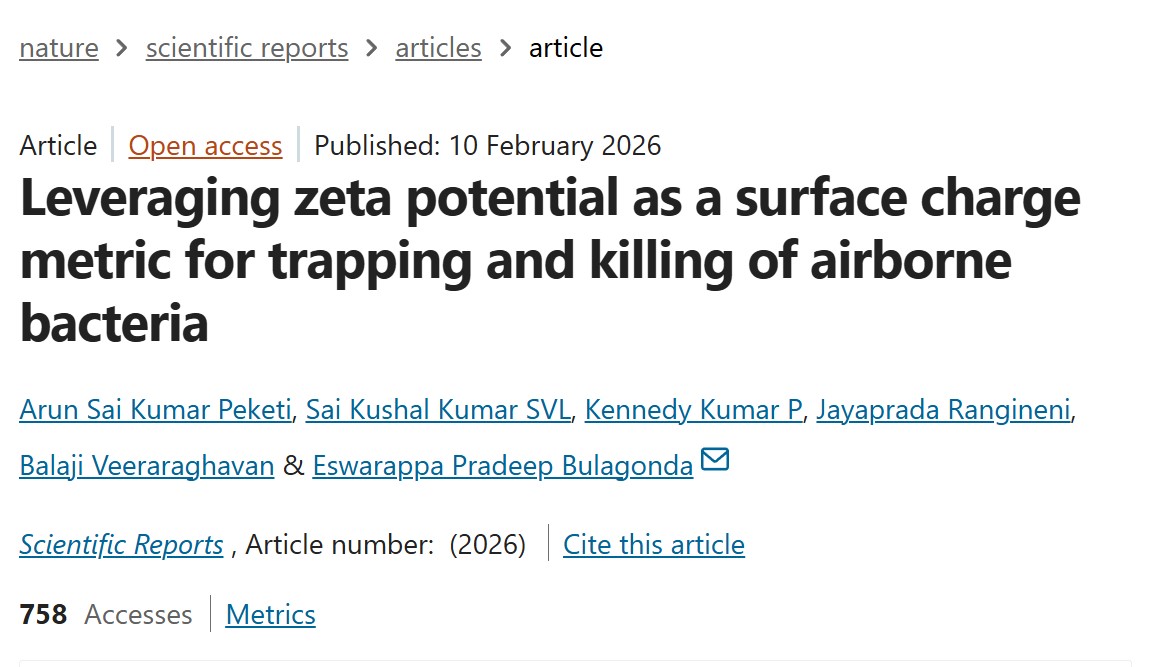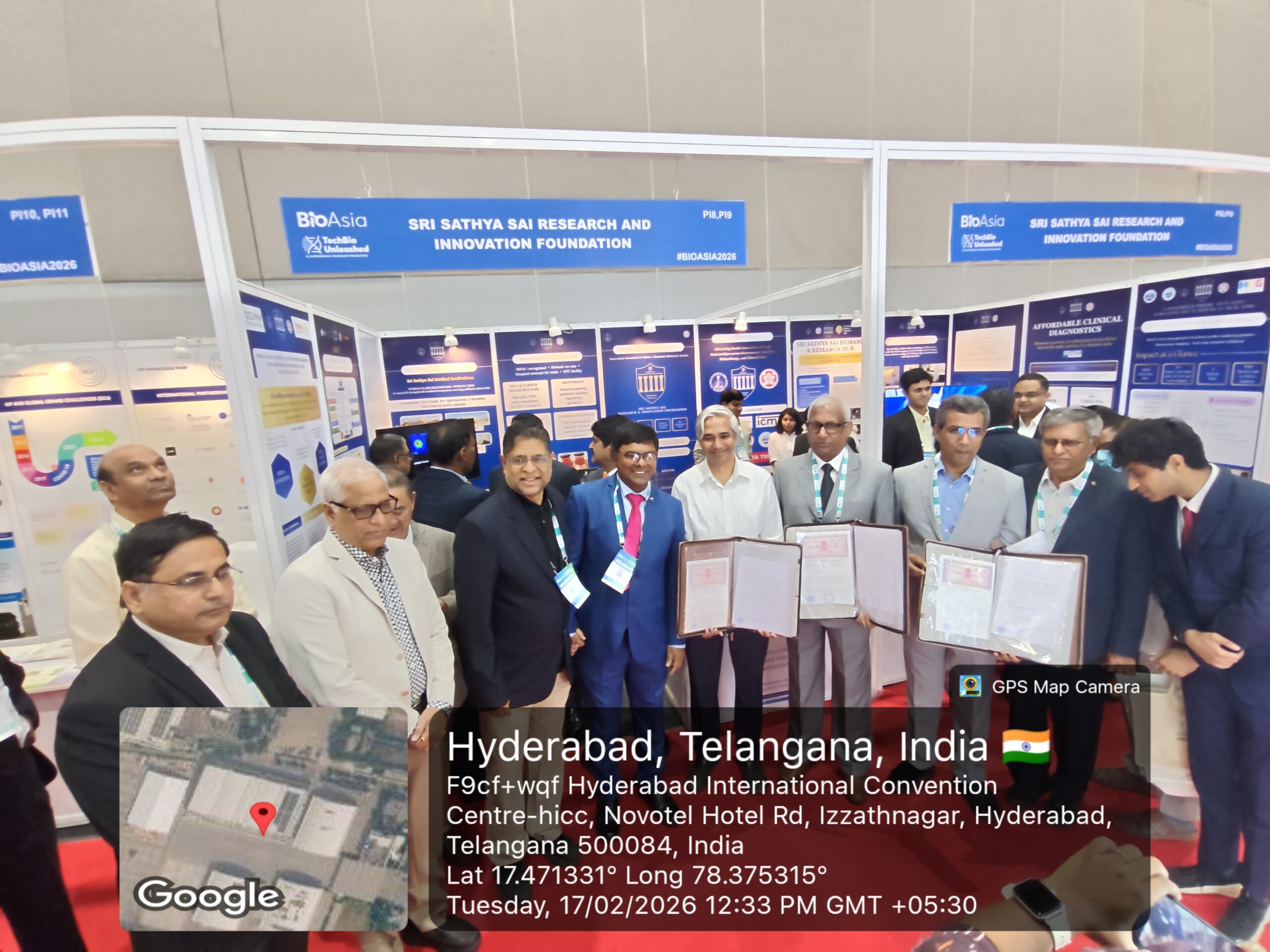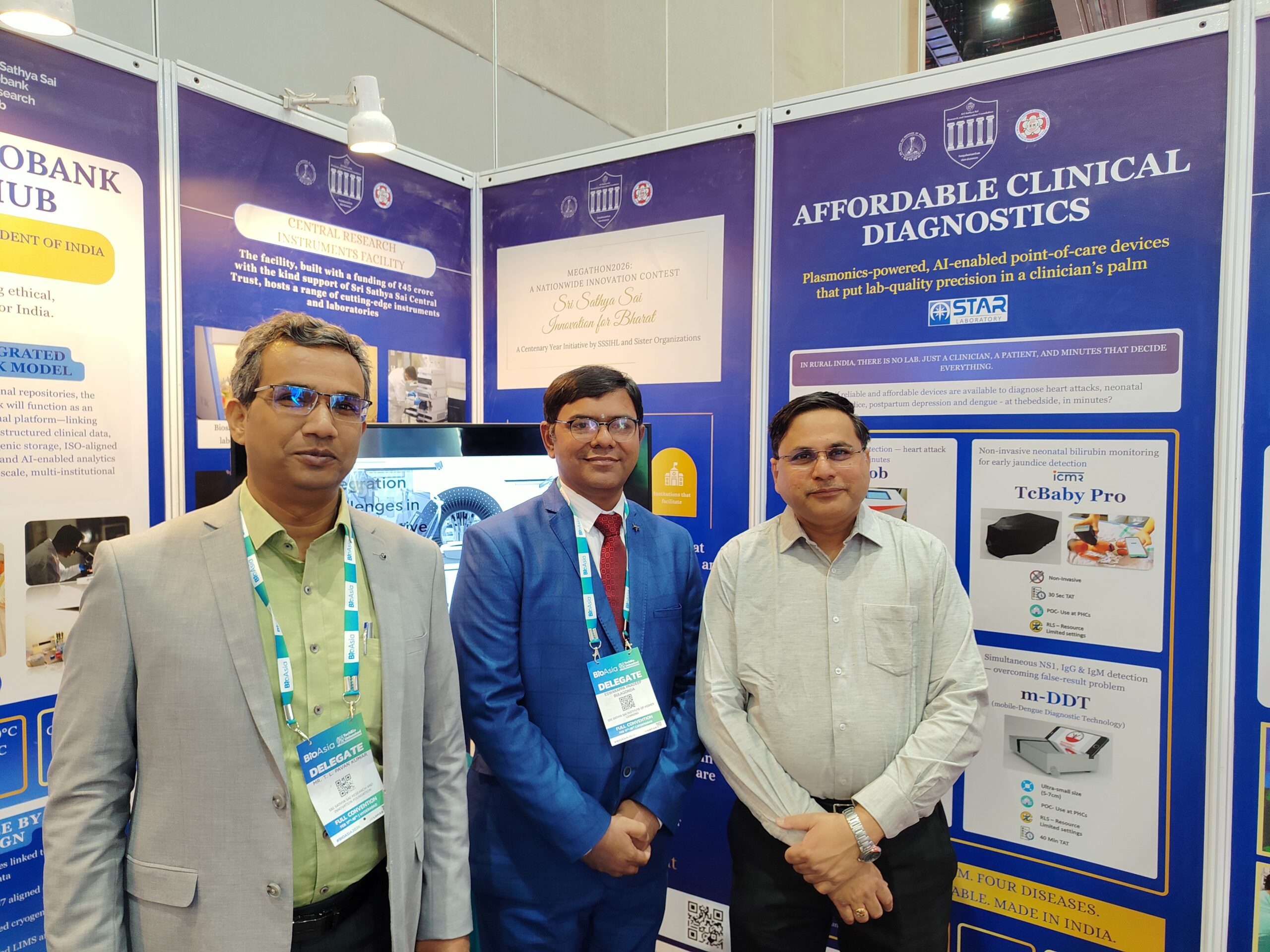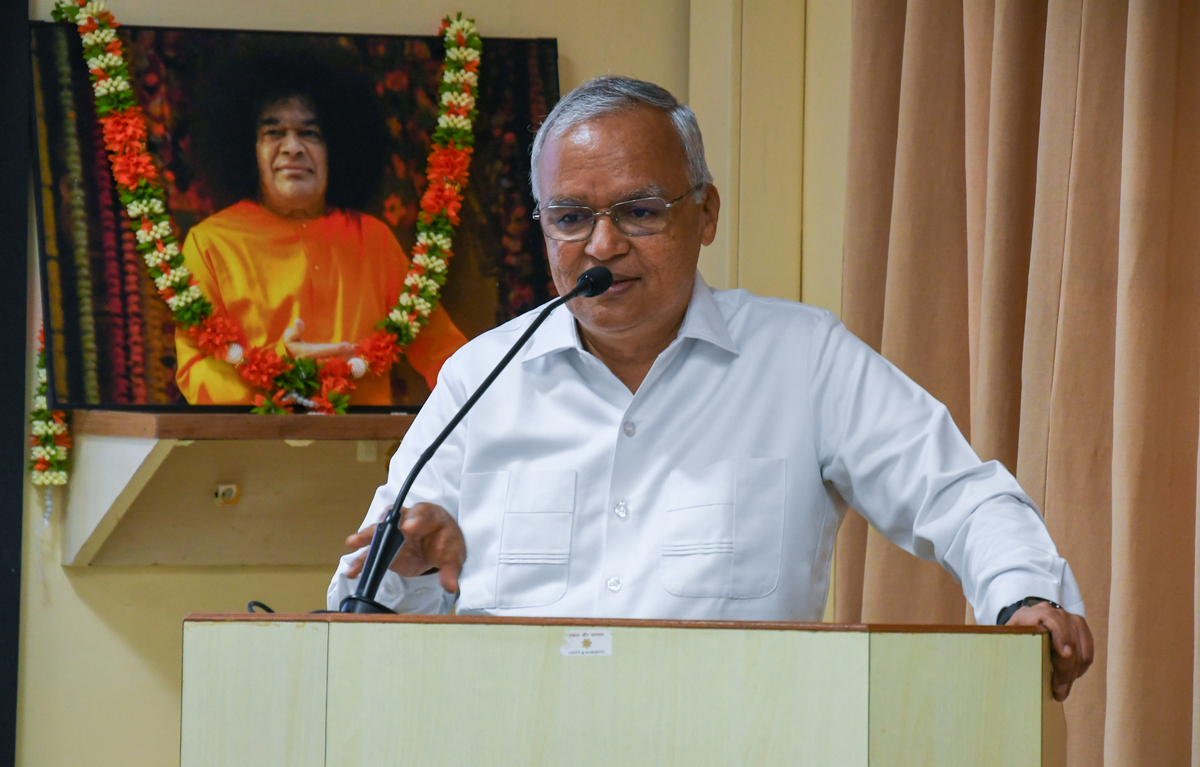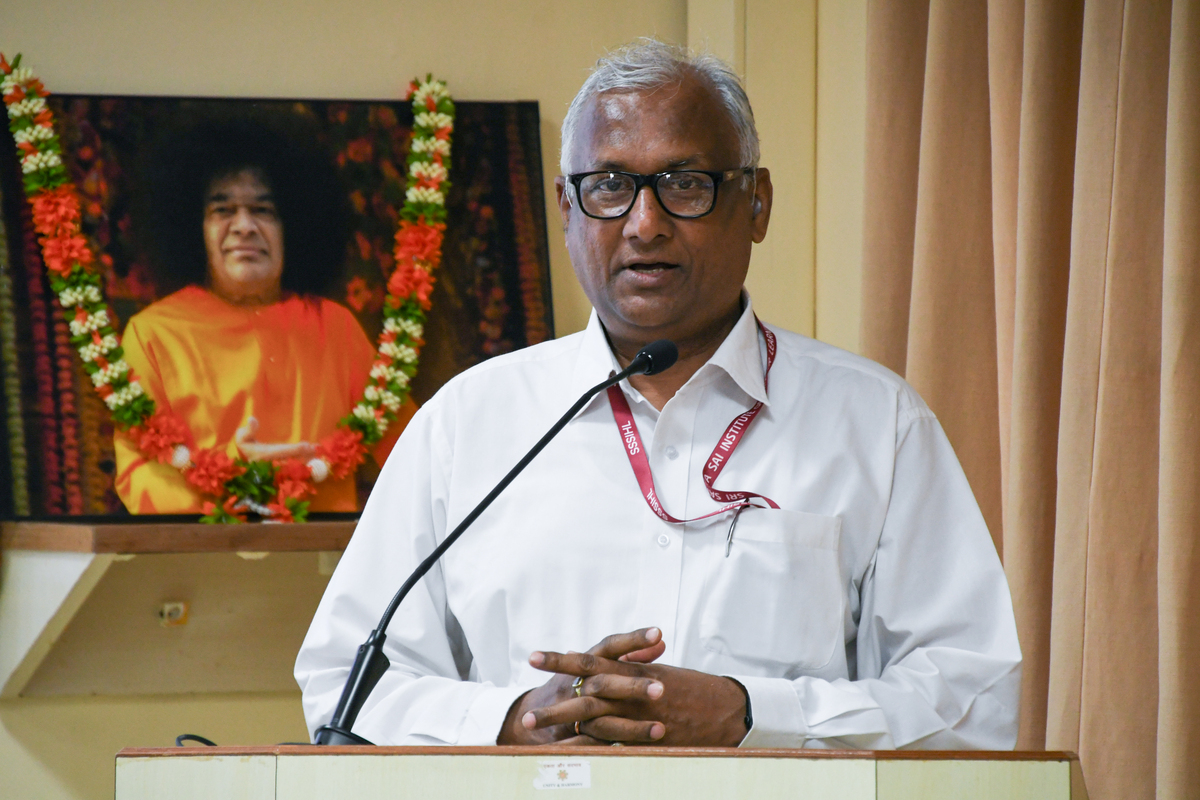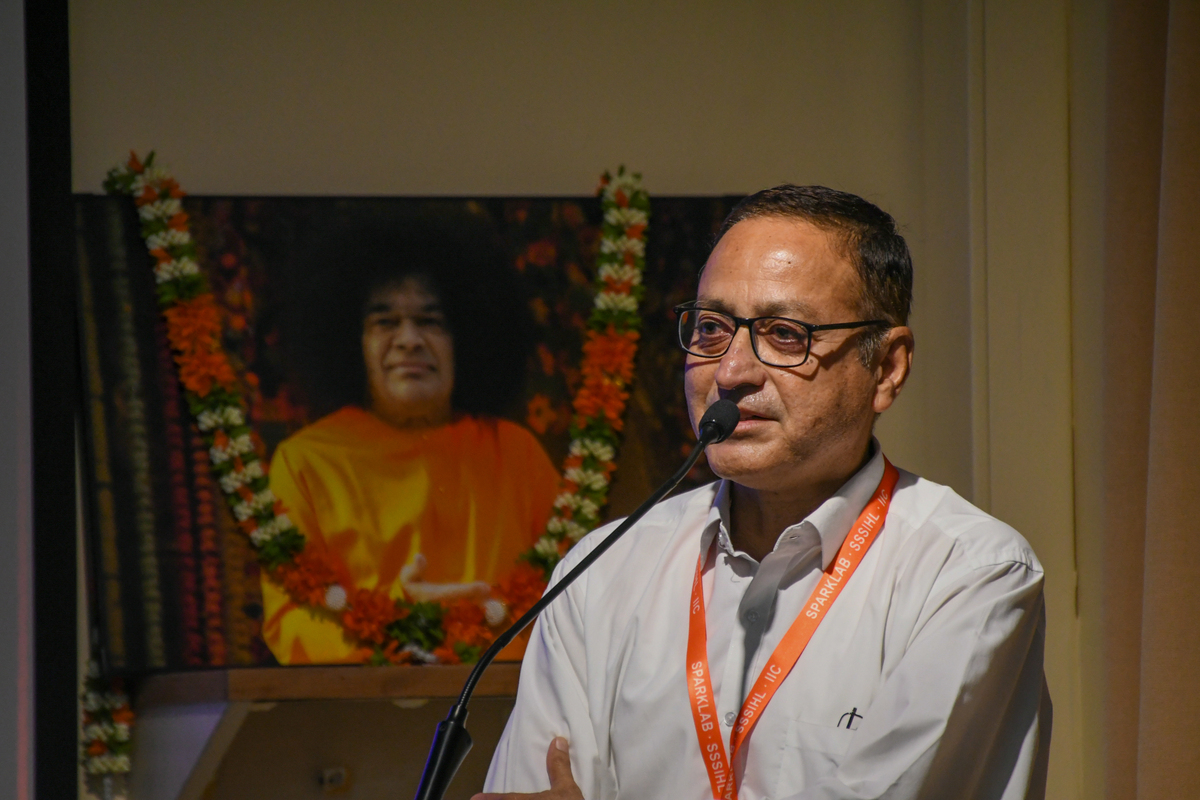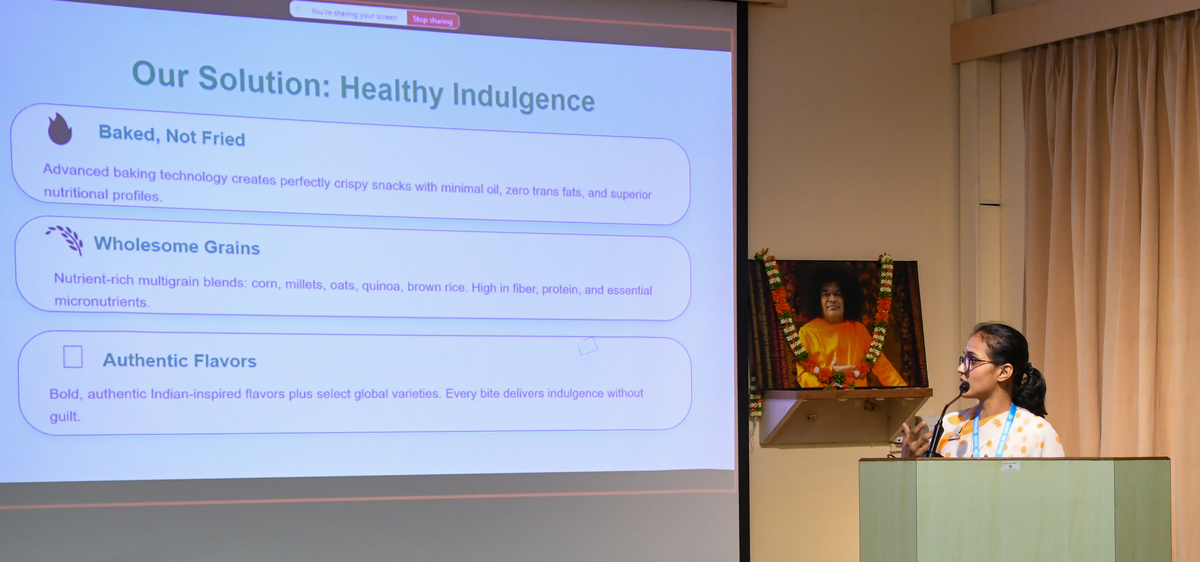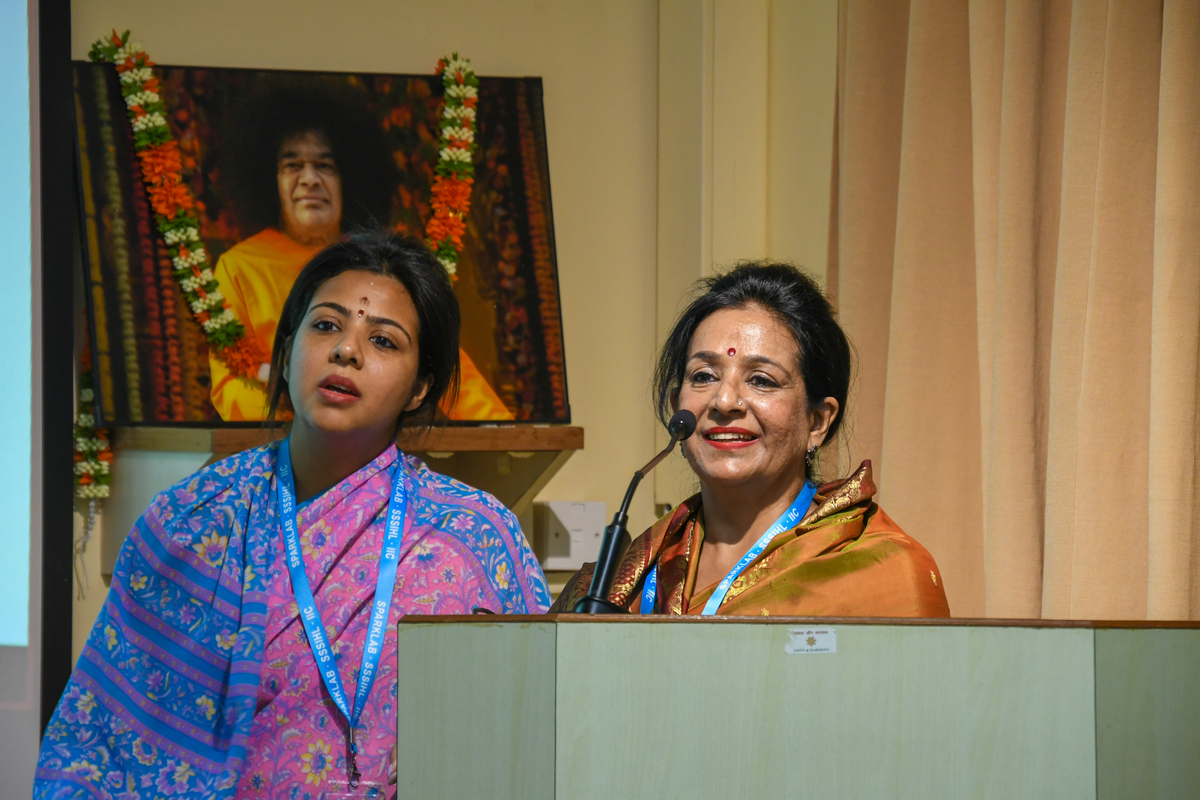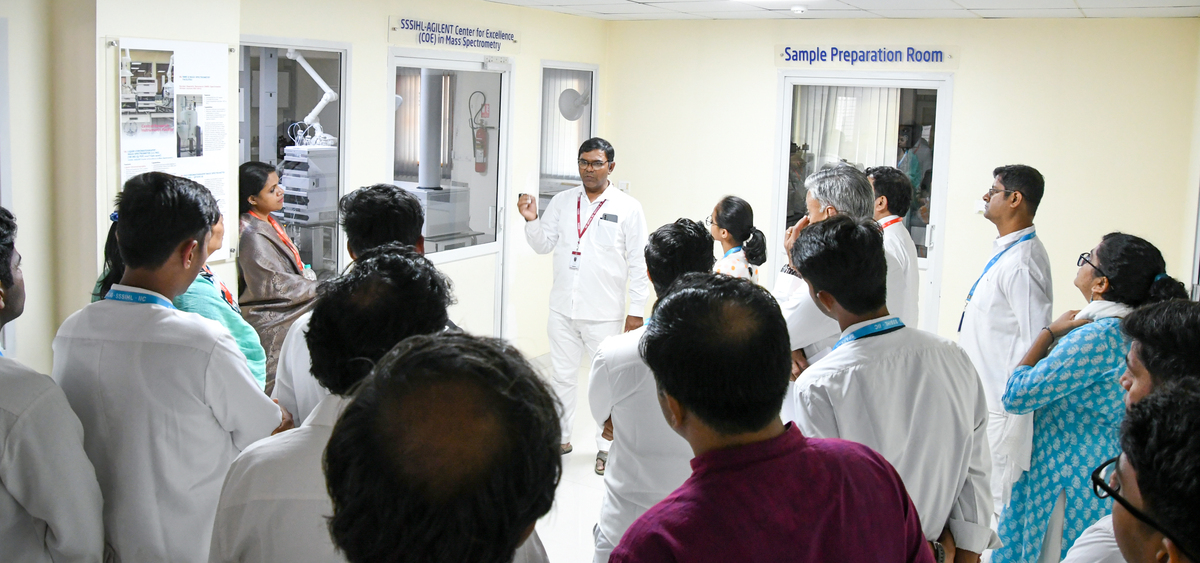The release of the ChampStamp Edition 2 Launch was held on 15th February at the Prasanthi Nilayam Campus Auditorium, with enthusiastic participation from students and faculty members from all the mens campuses of the Sri Sathya Sai Institute of Higher Learning.
Launch of ChampStamp Edition 2
The programme commenced with the lighting of the lamp, invoking divine blessings and marking the auspicious beginning of the event. This was followed by the screening of a documentary explaining the Annual Sports and Cultural Meet, its spiritual significance, and what it means to Bhagawan Sri Sathya Sai Baba and His students.
Subsequently, Dr. Sai Shyam, Assistant Professor, Department of Mathematics and Computer Science, addressed the gathering and spoke about ChampStamp and the Annual Sports and Cultural Meet, highlighting the spirit of unity, teamwork, and transformation reflected in the theme “I to We to He.”
This was followed by the logo reveal ceremony, symbolising the theme and vision of ChampStamp Edition 2.
The book launch ceremony was then presided by:
- Prof. Gowri Shankar, Dean, Academic Affairs
- Prof. P. L. Rani, Dean, Humanities and Social Sciences
- Dr. Raghavender Raju, Dean, Students Welfare
- Dr. R. Raghunatha Sarma, Director, Prasanthi Nilayam Campus
The dignitaries formally launched ChampStamp Edition 2, marking an important milestone in documenting the Annual Sports and Cultural Meet.
Following the launch, Prof. P. L. Rani, Dean, Humanities and Social Sciences, shared her reflections on the significance of the Sports and Cultural Meet in nurturing holistic excellence among students.
Translation of physicochemical properties of bacteria into an AMR combat strategy
Identifying the Issue
- Airborne bacteria in hospitals and homes can trigger respiratory infections and outbreaks.
- Drug resistant airborne pathogens reduce the effectiveness of routine infection control measures.
Objective of the Research
- To test the reliability of Zeta potential as a physicochemical marker, that can be harnessed to trap and eliminate airborne pathogens.
- To validate the efficacy of ZeBox, a novel air decontamination technology developed by Biomoneta, in trapping and killing clinically isolated multi drug resistant respiratory pathogens.
Who should read this?
Infection control teams, hospital administrators, ICU/NICU managers, microbiologists, public health professionals, healthcare facility engineers, and indoor air-quality/medtech stakeholders (India and global healthcare settings).
Solution
ZeBox technology harnesses the power of zeta potential, a universal physicochemical property to trap and kill airborne pathogens. When challenged with clinical isolates in a controlled BSL-2 setting, the device eliminated 99.9999% of airborne bacteria, within five minutes of operation. This efficiency was consistent across multiple species of bacteria. Further, the impact of biofilm formation and the antimicrobial resistance phenotype was found to be negligible on zeta potential and the kill kinetics of ZeBox. The tested isolates included five out of six ESKAPE pathogens and other well-known respiratory pathogens and with varying degrees of antimicrobial resistance. Since ZeBox deploys non-ionizing radiation, it is safe to be operated in presence of humans. These results demonstrate the superiority of ZeBox in eliminating airborne pathogens quickly and efficiently, both in clinical and domestic settings.
Key Features and Benefits
- Rapid reduction of viable airborne drug-resistant bacteria within minutes of operation
- Broad activity across multiple clinically isolated respiratory pathogens with varying resistance phenotypes.
- Uses zeta potential, an universal intrinsic microbial physicochemical property, which is stable across various pathogens
- Non-intrusive, ozone free, continuous-use air decontamination strategy.
Impact
- Smaller footprint compared to other industrial air decontamination technologies coupled with excellent bactericidal efficacy.
- Statistically significant 5-minute reduction of airborne microbial load vs. control condition (paired t-test t = −16.24; p < 0.00001; Cohen’s d = 5.53).
- Strong correlation between Zeta potential and ZeBox kill kinetics observed (Pearson’s r= -0.95, p <0.001)
- Supports infection-control strategies against hospital-associated infections in post-antibiotic and post-pandemic settings
Team
- Arun Sai Kumar Peketi: (https://www.linkedin.com/in/arun-sai-kumar-peketi-16664134/ )
- SVL Sai Kushal Kumar: (https://www.linkedin.com/in/kushal-solleti-b91648136/ )
- Balaji Veeraraghavan (https://www.researchgate.net/profile/Balaji-Veeraraghavan )
- Jayaprada Rangineni (https://www.researchgate.net/profile/Rangineni-Jayaprada )
- Kennedy P Kumar (https://www.researchgate.net/profile/Kennedy-Kumar )
- Eswarappa Pradeep Bulagonda (http://linkedin.com/in/pradeepbulagonda/)
The research team is thankful to Dr. Arindam Ghatak (https://www.linkedin.com/in/arindamghatak/ ) and Dr. Santanu Datta (https://www.linkedin.com/in/santanu-datta-966a52118/ ) of Biomoneta (https://www.linkedin.com/company/biomoneta/posts/?feedView=all) for providing access to the ZeBox Instrument.
Title of paper: “Leveraging zeta potential as a surface charge metric for trapping and killing of airborne bacteria.”
Read Paper Here: https://www.nature.com/articles/s41598-026-38958-x
MoU Exchange at BioAsia 2026 – Strengthening India’s Translational Ecosystem
We are pleased to share that on 17th February 2026, during the BioAsia 2026 Summit in Hyderabad, an MoU was formally exchanged between the Sri Sathya Sai Biobank & Research Hub (SSSIHL) and WT FABA Biocatalyst LLP (Whale Tank).
This collaboration establishes a structured, reciprocal framework enabling:
- Access to the Sri Sathya Sai Biobank for Whale Tank-supported startups for research, preclinical studies, and innovation
- Access for Sri Sathya Sai Institute of Higher Learning (SSSIHL)and Sri Sathya Sai Research and Innovation Foundation (SSSRIF) to Whale Tank’s GMP facility in Genome Valley
- A defined, transparent payment-based model for shared services
Strong governance around ethics, de-identified clinical data, confidentiality, and IP - As outlined in the MoU, the Sri Sathya Sai Biobank is being established as a state-of-the-art facility dedicated to the collection, preservation, and responsible provision of clinical samples with associated de-identified clinical histories. The initiative also envisions a National Consortium with pan-India reachto support research and innovation across the country.
This partnership reflects SSSIHL’s commitment to:
- Building high-quality biobanking infrastructure
- Supporting biotech startups with clinically relevant resources
- Enabling translational research through industry collaboration
- Integrating academic rigor with GMP-scale biomanufacturing access
We sincerely thank Markandeya Gorantla, Uday Saxena, and the Whale Tank team for their wholehearted support in shaping this collaborative framework.
Through structured partnerships such as this, SSSIHL continues to strengthen India’s ecosystem for responsible biomedical innovation.
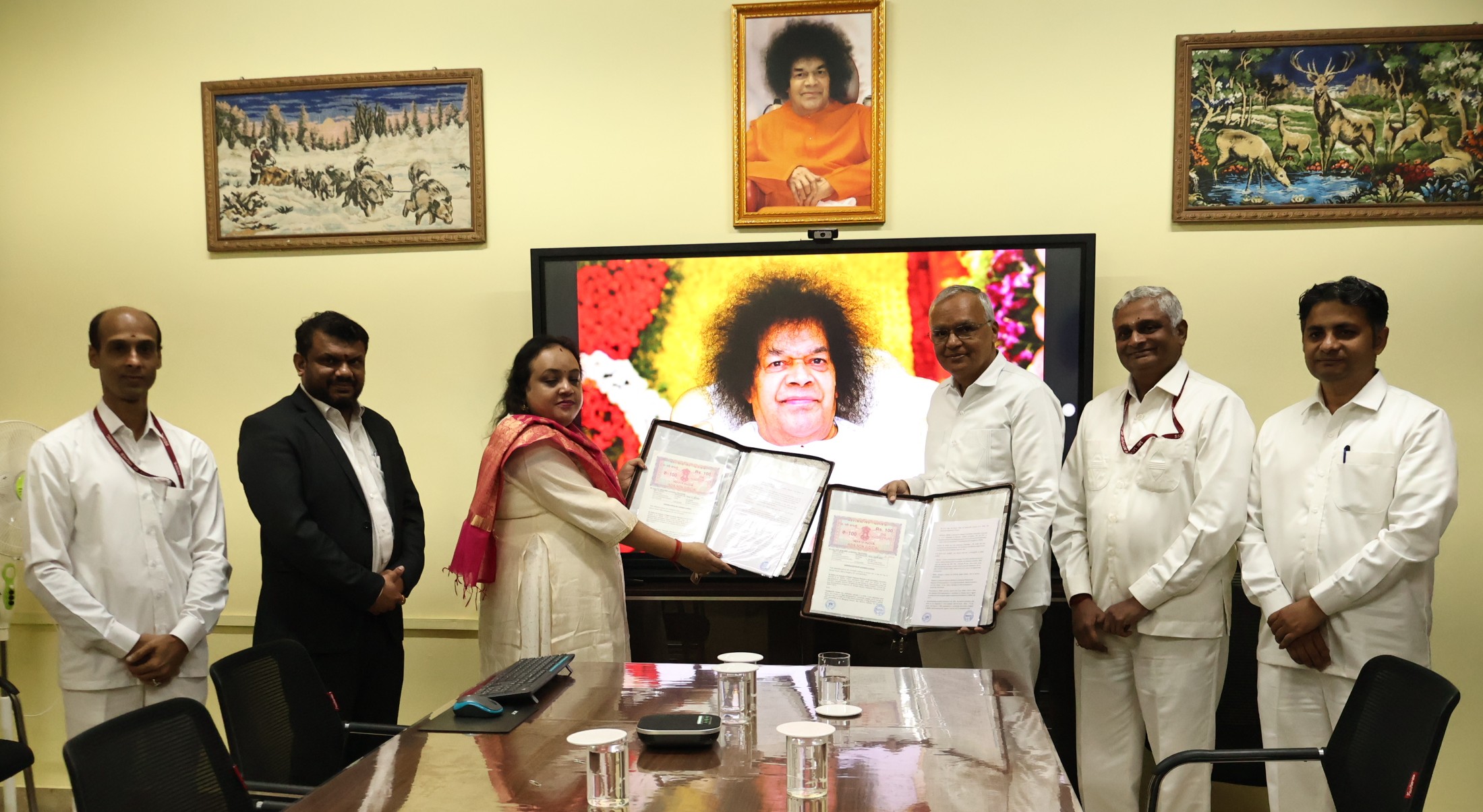
SSSIHL Partners with Global FTI for ACCA-Integrated B.Com Programme
In a landmark collaboration, Sri Sathya Sai Institute of Higher Learning (SSSIHL) signed a Memorandum of Understanding (MoU) with Global FTI on 24 January 2026 to align its B.Com. (Hons.) and B.Com. (Hons. with Research) programmes with the prestigious ACCA (UK) qualification. ACCA is globally recognised across 181+ countries for excellence in accounting, auditing, taxation, ethics, and digital finance.
The MoU was exchanged between Prof. B. Raghavendra Prasad, Vice-Chancellor, SSSIHL, and Ms. Soumya Nambiar, Managing Director, Global FTI, in the presence of senior officials from both organisations.
This partnership enables students to receive exemptions for some ACCA papers, significantly streamlining the pathway to global professional certification. With curriculum alignment to IFRS and Ind-AS, internships, and structured ethics training, the programme offers a rigorous, and values-driven route to ACCA membership.
Designed to empower graduates for high-impact careers in globally reputed audit firms and financial services in India and abroad, the programme blends SSSIHL’s values-based education with Global FTI’s professional expertise, ushering in a new era of academic and professional excellence.
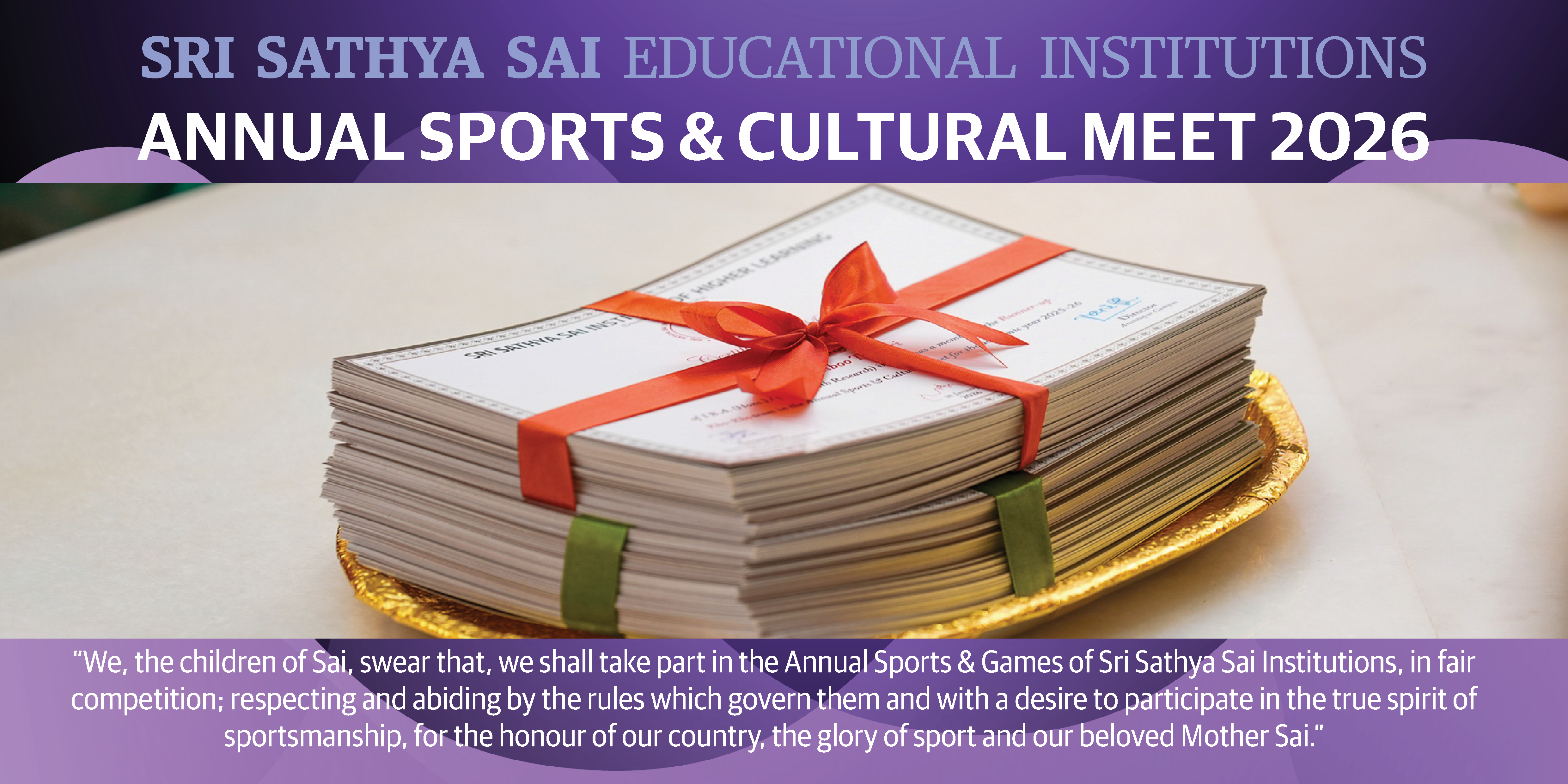
Annual Sports & Cultural Meet 2026 – Prize Distribution Ceremony
The Prize Distribution Ceremony of the Annual Sports and Cultural Meet 2026 for the Sri Sathya Sai educational institutions—a celebration of the excellent performances in sports, cultural and fine arts events during the academic year 2015/26 by students—was held on 15 January 2026, on the auspicious occasion of Makarasankranti, at Sai Kulwant Hall, Prasanthi Nilayam, Andhra Pradesh.
The programme commenced at 8:15 a.m. with a grand procession comprising the Institute brass band, a Veda chanting group of students, senior members of Sri Sathya Sai Institute of Higher Learning (SSSIHL) and a flag-bearing squad.
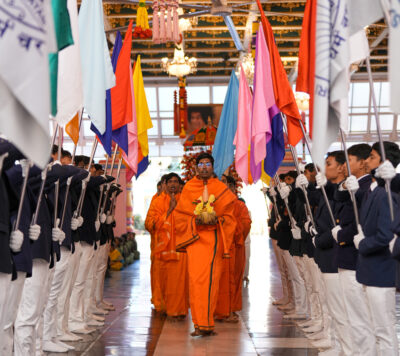

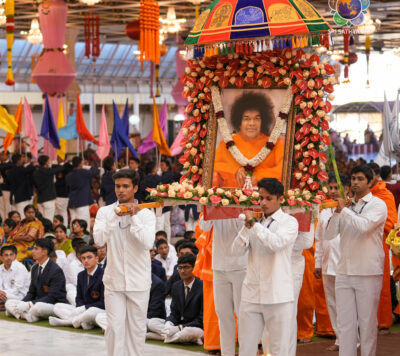
Introduction
The Master of Ceremonies, Ms. Beesetti Lohita, Doctoral Research Scholar, Dept. of Food & Nutritional Sciences, SSSIHL, in her introduction, remarked that the festival of Makarasankranti teaches us that after a period of intense effort, there must also be peace, joy and gratitude.
The first talk of the event was delivered by Dr. Chandrahaas C S, Assistant Professor, Dept. of Management & Commerce, SSSIHL. He likened the harvest Makarasankranti to the year-long effort students put into sports, cultural and fine arts events during the academic year 2025/26. He said the key lessons the Annual Sports & Cultural Meet teaches students are Self-Confidence, Self-Satisfaction (achieved by the singular goal of pleasing Bhagawan Baba), Self-Sacrifice (by giving up their physical comforts) and Self-Realization (the individual ego subsumed in group identity). The core of this, he concluded, is the faith students have in Him.
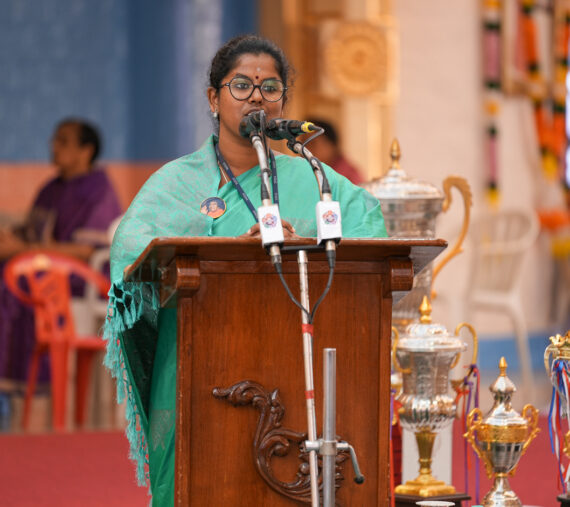
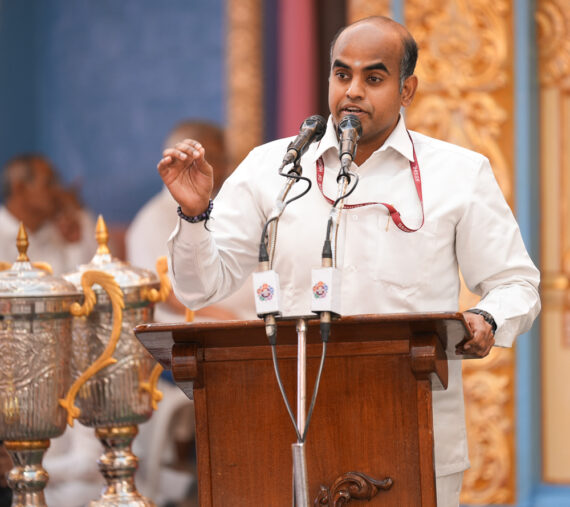
Brief Talks
Next up was a series of brief talks by students. They recalled the behind-the-scenes challenges, motivations, prayers and miracles that inspired them to come together in unity and surrender to participate in the Annual Sports & Cultural Meet, shaping them into instruments of peace and righteousness. Speakers included Mohan Sai S (XII Std.) and K Sai Dikshita (XI Std.) of Sri Sathya Sai Higher Secondary School (SSSHSS), N Janavi from Smt. Eswaramma High School, and four students from SSSIHL – Akshra H, II B.Com. (Hons.) from Anantapur Campus, Ritick Raj Gupta, II M.Sc. in Data Science & Computing from Nandigiri Campus, Pulkit Khare, II M.B.A. from Brindavan Campus, and Kinthada Sai Sampath Kumar, B.S. (Hons./Hons. with Research) in Mathematics from Prasanthi Nilayam Campus.
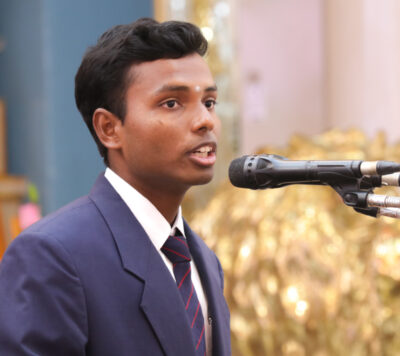
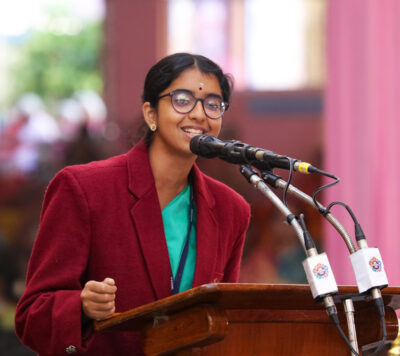
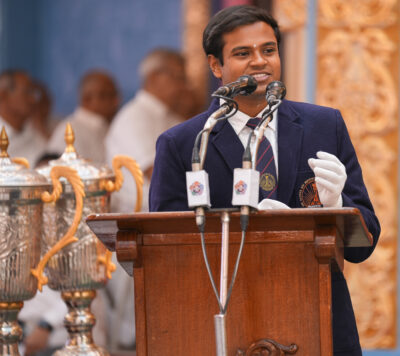
Cups & Prizes
Following the talks, the Founder Chancellor’s Cups—symbolizing the grand effort put in by each institution—were presented by Sri K Chakravarthi, IAS (Retd.), Hon’ble Chancellor, Sri Sathya Sai Institute of Higher Learning. The respective captains and vice-captains of each Sai educational institution and campus received them.
Sri R J Rathnakar, Managing Trustee, Sri Sathya Sai Central Trust and Prof. B Raghavendra Prasad, Vice-Chancellor, SSSIHL, then presented trophies to the House and Individual champions of SSSHSS and each SSSIHL campus, respectively, under various sports, cultural and fine arts categories.
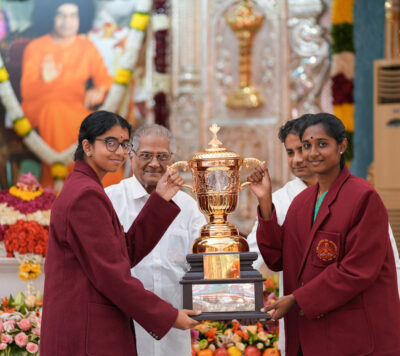
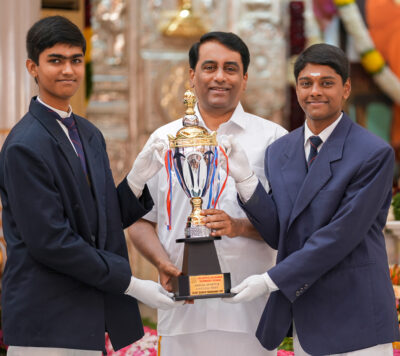
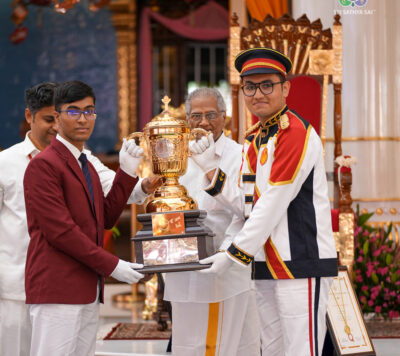
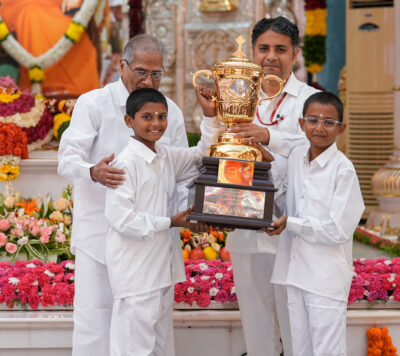
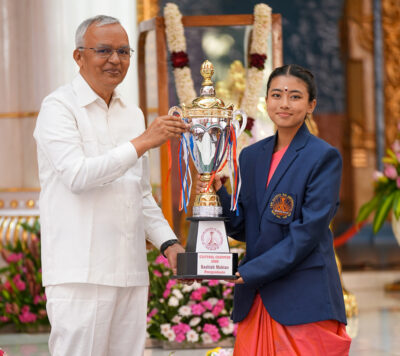
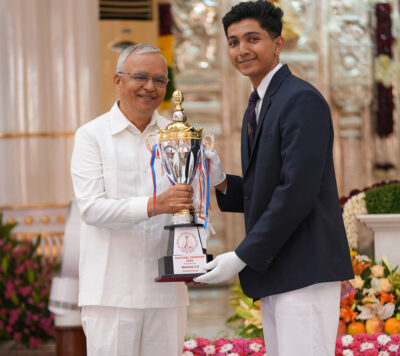
Sri Sathya Sai All Rounder Gold Medal
Every year, a student from each SSSIHL campus receives the Sri Sathya Sai All Rounder Gold Medal. Founded by Bhagawan Baba Himself, this esteemed award honours consistent exemplary conduct, discipline, devotion, outstanding academic performance, and involvement in activities such as sports, dramatics, Self-Reliance, and spiritual work. It truly exemplifies excellence in Sri Sathya Sai Values-based Integral Education.
Presented by Prof. B Raghavendra Prasad, Vice-Chancellor, SSSIHL, this year’s awardees were:
- Gouri Nandana S, II M.Sc. in Biosciences, Anantapur Campus
- Dhanireddy Nanda Vardhan Reddy, II M.Sc. in Data Science and Computing, Nandigiri Campus
- Yeddula Sai Tharun Kumar Reddy, II M.B.A., Brindavan Campus
- B Saisudharshan, II M.A. in Economics, Prasanthi Nilayam Campus
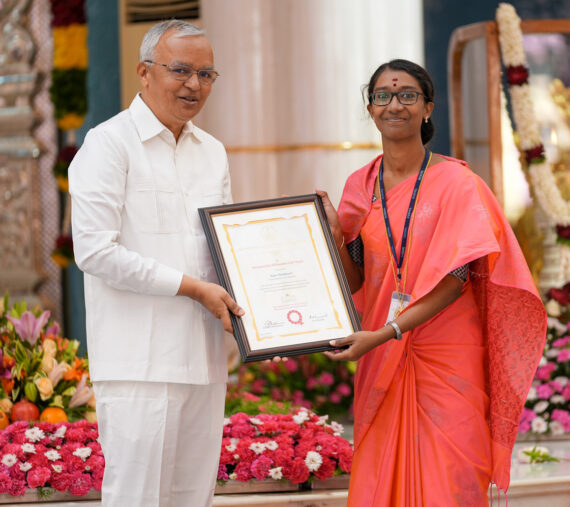
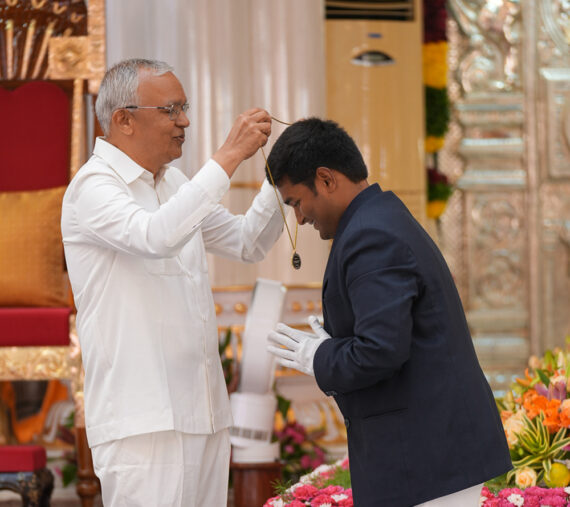
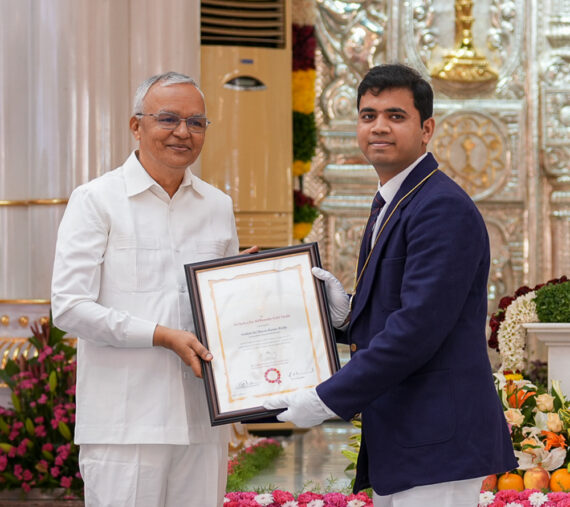
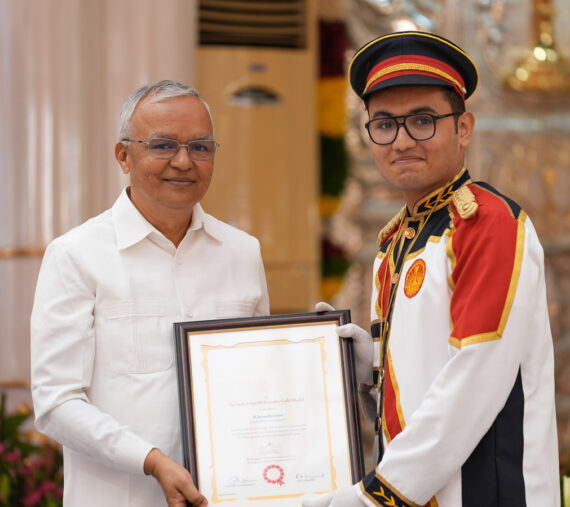
Founder Chancellor Best Teacher Award
Prof. Gowrishankar R, Dean of Academic Affairs at SSSIHL, then announced the Founder Chancellor Best Teacher Award for Excellence in Teaching, Research & Values-based Integral Education at SSSIHL. The award recognises the significant role teachers play in Sai educational institutions, shaping and guiding students not only academically but also moulding them into women and men of character.
Dr. Pradeep B E, Associate Professor, Dept. of Biosciences, received the award for academic year 2025/26 from Prof. B Raghavendra Prasad, Vice-Chancellor, SSSIHL.
Next, the Physical Directors and Sports, Cultural, and Fine Arts Coordinators of each Sri Sathya Sai educational institution took namaskar of Bhagawan Baba and submitted the prize lists for the current academic year to Him.
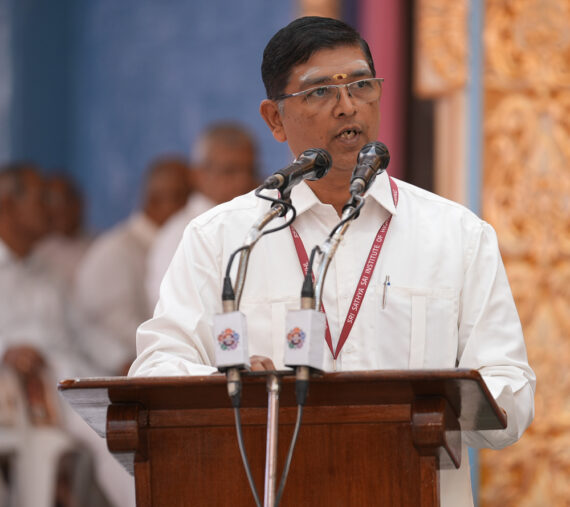
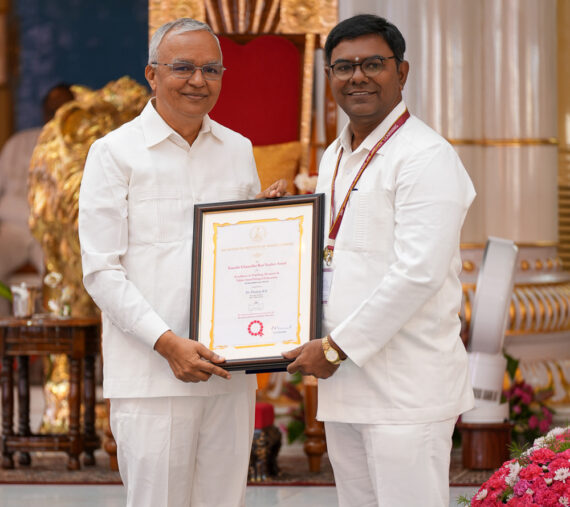
Divine Benediction
This was followed by the Divine benediction of Bhagawan Sri Sathya Sai Baba. His discourse focused on the existence of Divinity in totality and beyond all boundaries. He explained the true nature of the five elements and their interconnectedness with all life on Earth. He asked students to recognise this all-pervasive power (of Divinity) within themselves and not to look for it externally. He said it is the true source of protection. He said that every act of God is for the benefit of all.
He appreciated the efforts students make during the Sports & Cultural events to please Him, but reiterated that the only thing that makes Him happy is that all of us are happy. The only way this can happen is to be full of love and joy, to serve others, and to become ideal examples by following the spiritual path.
Following a few pieces by the Institute brass band, prasadam distribution and bhajans, the event concluded at 11 a.m.
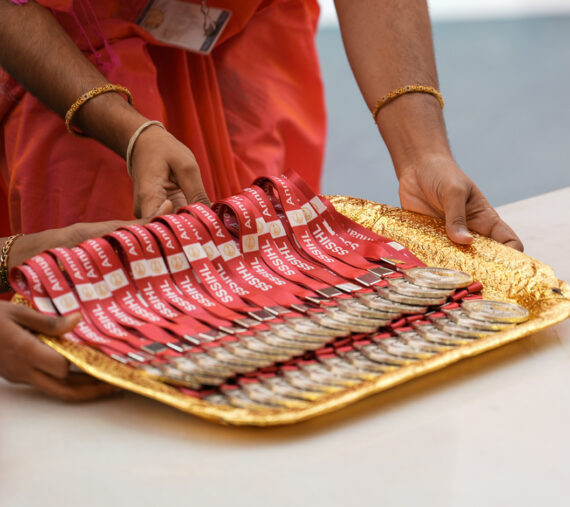

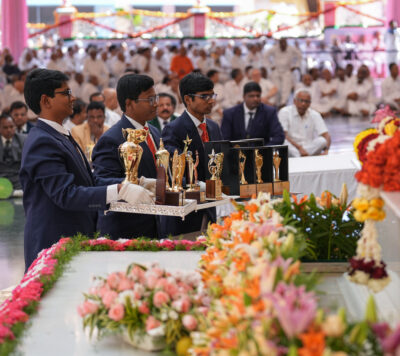

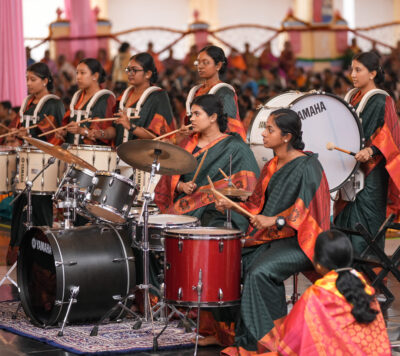
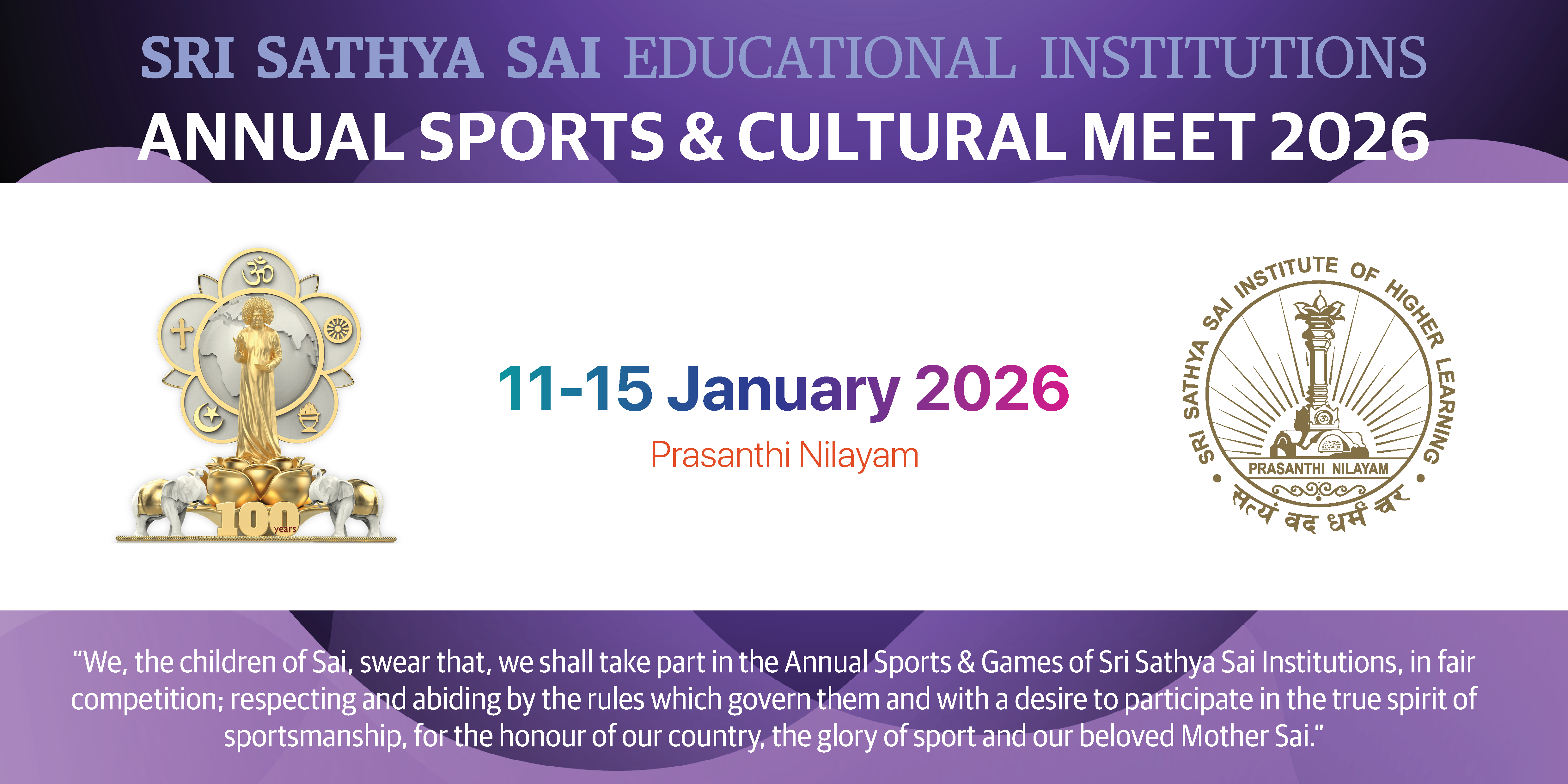
Annual Sports & Cultural Meet 2026
Media for the Event
Press Release of the Main Event (11 Jan 2026).
Video recording of the Main Event – Morning Session (11 Jan 2026).
Video recording of the Main Event – Evening Session (11 Jan 2026).
Video recording of the Cultural Event (13 Jan 2026).
Video recording of the Cultural Event (14 Jan 2026).
Video recording of the Cultural Event (15 Jan 2026).
11 January – The Main Event
The Sri Sathya Sai Educational Institutions held the main event of the Annual Sports & Cultural Meet on 11 January 2026 at the Sri Sathya Sai Hill View Stadium, Prasanthi Nilayam, Andhra Pradesh, India.
This annual event is a heartfelt tribute from over 3500 students (from primary school to Ph.D.) of Sri Sathya Sai Educational Institutions to our Beloved Revered Founder Chancellor, SSSIHL, Bhagawan Sri Sathya Sai Baba. The institutions include four campuses of Sri Sathya Sai Institute of Higher Learning (SSSIHL), Sri Sathya Sai Higher Secondary School (Primary section, Girls wing and Boys wing), Smt. Eswaramma High School, and Sri Sathya Sai Institute of Higher Medical Sciences (SSSIHMS) College of Nursing and Allied Health Sciences.
The presentations are the culmination of various sports, cultural and fine arts competitions held across all campuses of the Institute and other Sai educational institutions throughout the academic year 2025-26. This year also marked the Birth Centenary Year of Bhagawan Sri Sathya Sai Baba.
The signature feature of this event is that every teacher and student is involved in some capacity. This process is one of several ways in which the conscious effort of man-making and character-building at Sai educational institutions truly succeeds. It prepares students to navigate the toughest of situations without sacrificing their principles and values. At the same time, it helps build strong inner qualities such as a sense of unity and teamwork, determination, discipline and hard work.
Preparations began a month in advance.
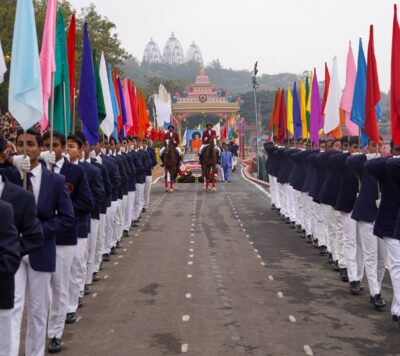
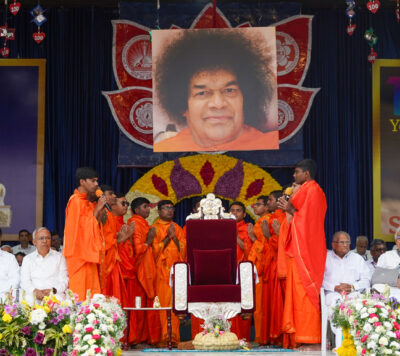
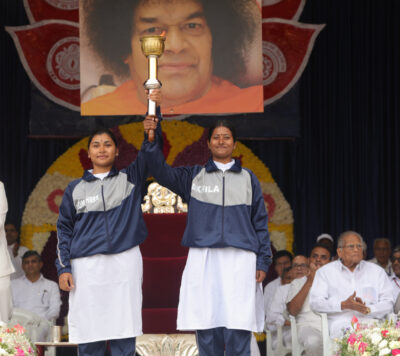
The Morning Session
The morning session commenced at 8 a.m. with Bhagawan Baba’s car entering the Sri Sathya Sai Hill View Stadium, flanked by the motorbike escort team of SSSIHL. The procession was led by Sai Melodies, the women’s brass band of SSSIHL Anantapur Campus, playing the devotional bhajan “Jai Ho Sai Ram.” It was ceremonially escorted by women equestrians riding two majestic horses. A flag salute was given by all the House and Institute Captains of SSSIHL, schools and allied institutions. This was followed by an escort by the Slow March Squad, a special contingent led by the men’s brass band of the Prasanthi Nilayam Campus, SSSIHL.
Following the ceremonial welcome to Bhagawan, which concluded with the students chanting the Vedas, the Vice-Chancellor and Registrar of SSSIHL, along with senior members of the Sai educational institutions and students representing each institution, offered salutations to Bhagawan.
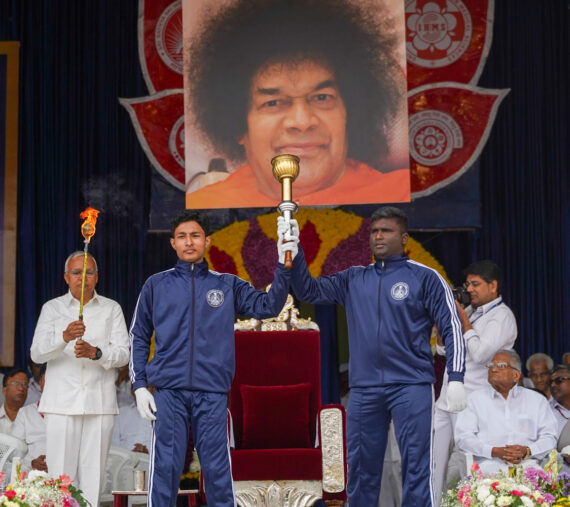
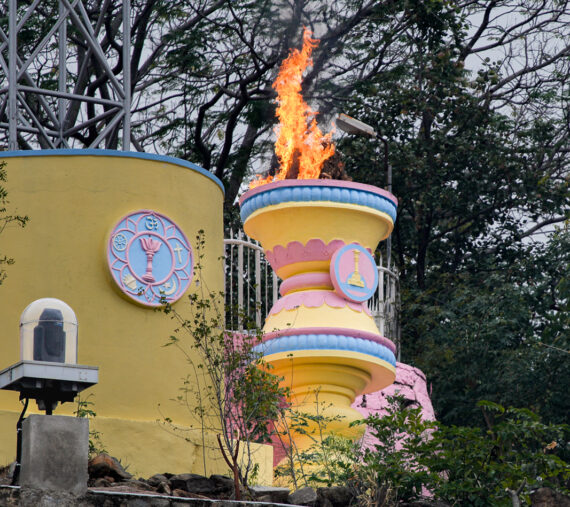
The March Past that followed included each Sai student marching in unison towards the dais at Shanti Vedika where Bhagawan Baba sits, offering their salutations to Him.
This was followed by the hoisting of the University flag, which represents unity and the promise to uphold the honour and glory of Sri Sathya Sai’s mission. Students then took the Sports Meet oath. This was followed by the unveiling of this year’s mascot – the Exotic Pigeon, a timeless symbol of peace, purity and hope. As the mascot flew into the main torch next to the Gods of Hill View, it marked the commencement of the 2026 Annual Sports & Cultural Meet.

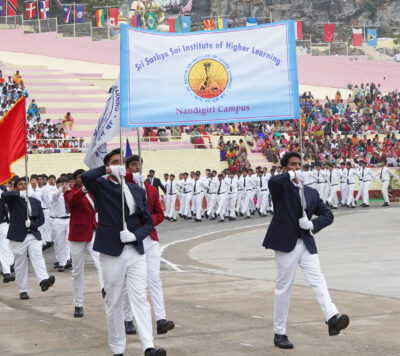
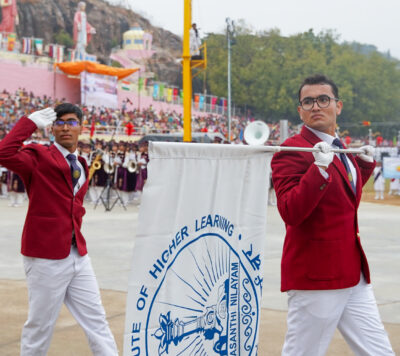
Students of all the Sai educational institutions—gathered on the ground—then gave a collective bow to Bhagawan Baba, celebrating the 100th year of the advent of the Divine Master.
The brass bands of the Primary section of Sri Sathya Sai Higher Secondary School and SSSIHL Anantapur Campus then played a piece, with the Institute Band members joining in unison, as they marched past Shanti Vedika, saluting their Divine Master. They were followed by the Institute brass band, which offered its salutations. This signalled the commencement of the day’s presentations.

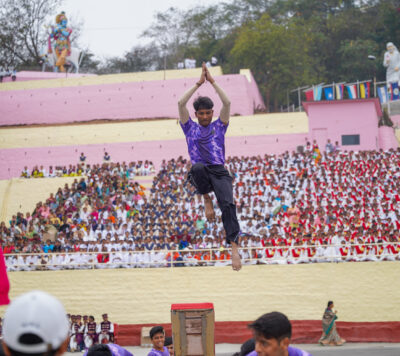
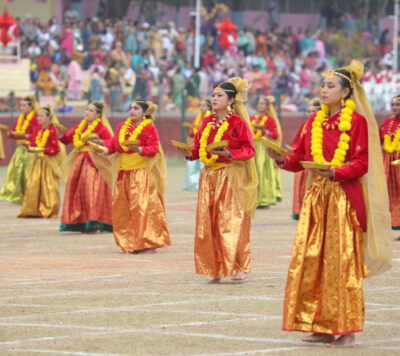
The Presentations
The women students of SSS Educational Institutions, SSSIHL Anantapur Campus and SSSIHMS College of Nursing and Allied Health Sciences were the first to present. Their theme, The Art of Sports: A Grateful Offering, depicted the philosophy of sports beginning with art; and art paving the path.
Their six presentations were named The Flexifits, The Numinous Nrutta, The Frisky Flips, The Dancing Damsels, The Festive Flags and The Racing Riders. They included a display of synchronised asanas, the ancient Bhārateeya art of Nātya, a colourful aerial display, traditional folk dance, five-foot flags handled with dexterity and diligence, and a beautiful human formation that read: Forever Yours.

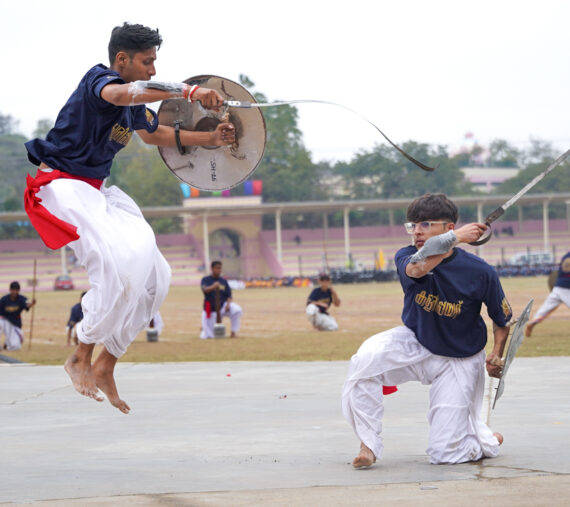
This year, the students of SSSIHL Men’s Campuses–Prasanthi Nilayam, Brindavan and Nandigiri–presented a combined performance of twelve items, split into two sessions.
Their morning presentation began with a larger-than-life installation of Ardhanarishvara, representing the divine union of Lord Shiva (masculine principle, Purusha) and his consort, Goddess Parvati (feminine principle, Prakriti or Shakti), which was rolled into the stadium. The Resonant Drummers then ignited the arena with a powerful symphony of rhythmic Chinese drums, ably accompanied by a variety of instruments. This was followed by Sky Sentinels, a Zipling event, then Utplavangamaah (meaning High Jumper), a teeterboard-based gymnastics item, and Gear Grind, a vibrant cycling presentation featuring a host of solo and group stunts and an innovative cycling football game.
Aerovyuh, the next item, showcased a medley of agile body movements and skillful gymnastics on the ground and on a giant German wheel. This was followed by their final presentation of the morning, Kalaripayattu, an ancient Indian martial art depicted through choreographed duels with traditional weapons, reflecting discipline, devotion, and martial excellence.


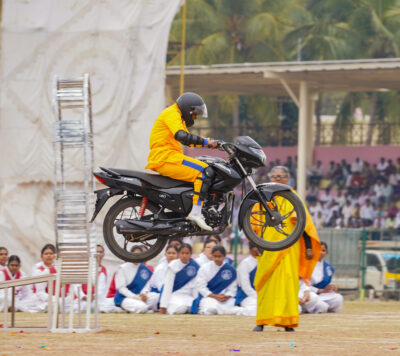
The grand formation around Sai brought together all the students from this morning’s presentation before paving the way for the final item.
No Sports Meet is complete without the signature item of motorbike stunt riding. This year, the students of Anantapur Campus, SSSIHL, returned for their final ensemble, featuring forty bikers performing synchronised riding and stunts, including criss-crosses, circular formations, and jumping over ramps and rings.
The morning’s presentation ended with Mangala Arati offered to Bhagawan Baba.
The Evening Session
The evening session of the 2026 Annual Sports & Cultural Meet began at 4:15 p.m. with the ceremonial procession welcoming Bhagawan Baba to the Sri Sathya Sai Hill View Stadium. It was led by the motorbike escort team of SSSIHL, followed by two majestic horses ridden by equestrians, and the Brass Band of Brindavan Campus, SSSIHL, playing the devotional song “Hum Tere Hai Sai”. As the Slow March Squad reached the dias, students chanted the Vedas, and the Vice-Chancellor and Registrar of SSSIHL, along with senior members of the Sai educational institutions and students representing each institution, offered salutations to Bhagawan.
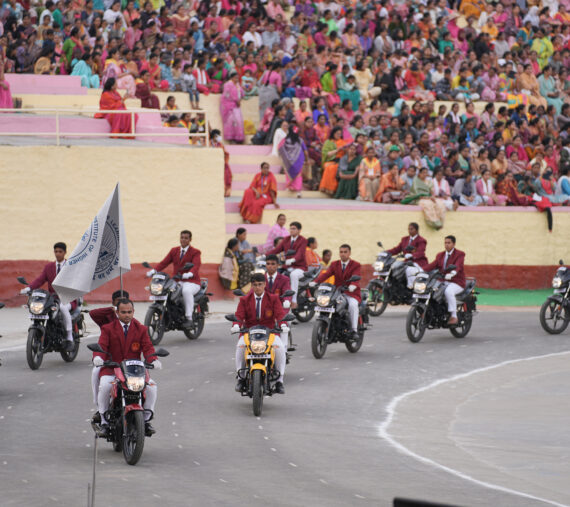
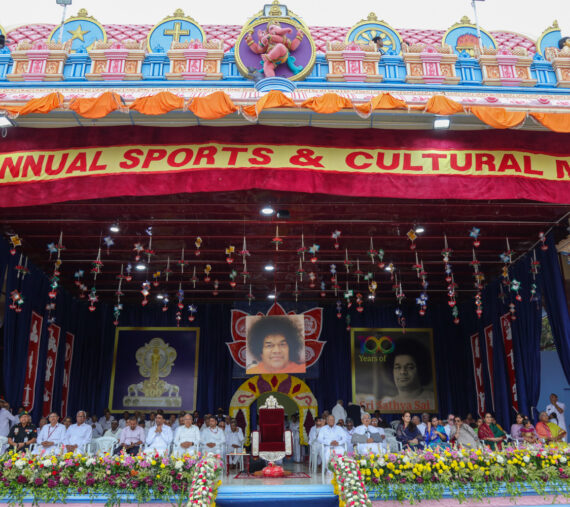
The Presentations
Students of Smt. Eswaramma High School had the honour of performing the opening act. The I to XI Std. girls presented a delightful blend of innocence, rhythm and devotion (Radha Krishna Dance); eye-catching formations adorned with glittering fabric (Drape Scape); and a dance set to the sacred hymns of Lord Shiva (Shiv Tandav). They were followed by the I to VIII Std. boys, whose items, Elf Dance and Buugeng, showcased gymnastics and Japanese martial arts.



They were followed by a series of presentations by students of SSS Higher Secondary School (Primary section & Girls wing). From The Dauntless Heroes on the Swing (acrobatic swirls and whirls under the banner that reads: Power and Fortitude come from Within) to the Celestial Dance of the Acqua World, the tiny tots of the Primary School immersed themselves in the oceanic bliss of the marine world, taking the audience along for the ride.
Other items ranged from a kathak-based dance to an ode to the Gods – especially Hanuman and Shiva. The highlight of their performance was the sheer range of colours, costumes and props – most of which were handmade by the students themselves. This was evident in the multitude of human formations the entire group created as a final offering, spreading love and joy among the spectators.
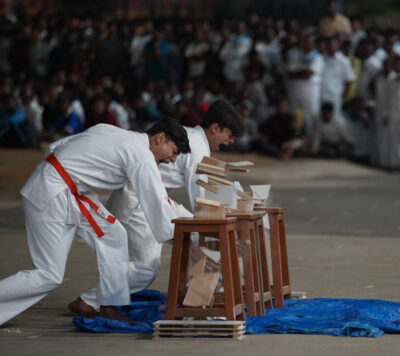

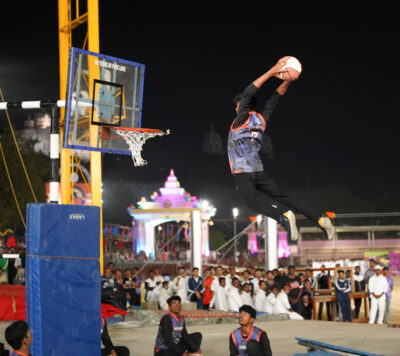
Presentations by students of SSS Higher Secondary School (Boys wing) and Smt. Eswaramma High School (VIII-X Std. Boys) followed. Soulful Bhangra dancing was followed by synchronised acrobatic movements, including aerial stunts and formations, by the Celestial Ascendants. The Astral Aligners then took the stage. The deft blend of art and science was evident as these students balanced geometry and symmetry with music with grace and maturity.
They concluded their performance with Garba and Dandiya Raas – Gujarati folk dances central to the Hindu festival of Navratri, symbolising profound spiritual and cultural concepts.


For the final performance of the day, students of SSSIHL Men’s Campuses–Prasanthi Nilayam, Brindavan and Nandigiri–narrated the spiritual process of transformation, using Giant Puppets depicting the Dashavatara.
Sai-Shin-Kai, a team of over a hundred martial artists, then took the field for a martial arts display that combined the disciplines of Karate, Kung Fu and Taekwondo, featuring stunts and nunchaku and sticks.
Airborne, a trampoline basketball spectacle, highlighted a rush of lift, momentum, and nerve—stacked with insane rebounds, liquid-like flips, and thunderous dunks. This gave way to Rope Mallakhamb (popularly known as Rope Yoga), a display of powerful and graceful stunts that depict strength, balance, flexibility, endurance and body control.
Echoes of the Ayudhas – Stories of the Lord told through His Weapons, a thematic presentation that portrayed the changing role of dharma and recollected the leelas of the Gods through their sacred ayudhas (divine weapons of the Gods or implements used in daily life) across the Yugas.

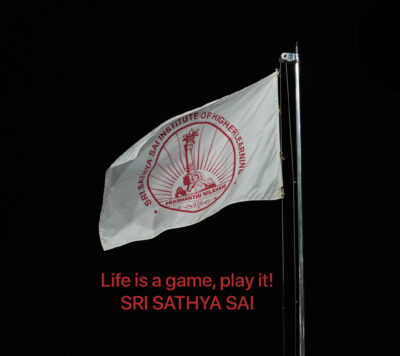

As night fell over Sri Sathya Sai Hill View Stadium, a groundbreaking performance using wirelessly controlled LED suits (a first at the Annual Sports & Cultural Meet) displayed changing formations that conveyed stories with light and colour. The “Illuminators” smoothly shifted from cosmic designs to significant shapes, honouring teamwork, devotion, and the influence of light. Through coordinated movements, they employed advanced technology to animate timeless tales of collaboration and faith in a contemporary and captivating manner.
All participating students then came together in grand formation to sing a devotional song to their Divine Master.
Mangala Aarati offered to Bhagawan Baba brought the Sports Presentations for the 2026 Annual Sports & Cultural Meet to an end.
13 January | Cultural Presentation – SSSIHL Anantapur Campus
Godfidence: The Ground Reality – A docudrama
A deeply moving docudrama that retraced cherished moments from decades of Sports & Cultural Meets—when human effort on the ground was transformed by divine presence.
Through music, narration, dance, and soul-stirring memories, the students revisited a legacy shaped by Bhagawan Sri Sathya Sai Baba’s love and encouragement.
Recounting their journey from diffidence to daring, they reflected on how Bhagawan’s words inspired generations of Anantapur students to attempt feats of courage—be it dance, bike stunts, or acts of quiet determination—coining this inner strength as Godfidence.
Interwoven with timeless Sports Meet songs, alumni voices, and heartfelt performances, the docudrama celebrated not just memories, but the enduring impact of Swami’s guidance, affirming that with His grace, the impossible becomes possible.
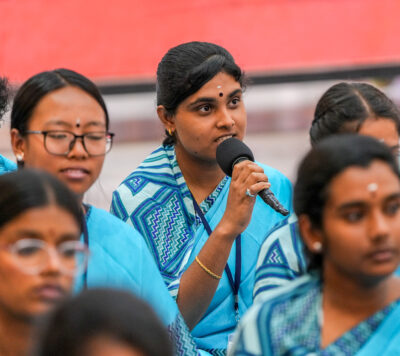


14 January | Cultural Presentation – SSSIHL Men’s Campuses
Premāmṛita: The Nectar of Love, Expressed through Sound – A Musical Symphony
This symphony ensemble by over 120 students of SSSIHL Men’s Campuses at Prasanthi Nilayam, Brindavan, and Nandigiri, presented a thoughtfully woven journey of twelve musical offerings spanning Carnatic and Hindustani classical, fusion, band compositions, and an evocative a cappella rendition. From the auspicious opening Ganesha Vandana to soulful pieces that stirred nostalgia and devotion, each segment unfolded as an expression of love placed at Bhagawan’s Lotus Feet.
Indian classical instruments, Western orchestral sections, and a full brass band blended seamlessly, reflecting unity in diversity and precision rooted in discipline. A standout moment was the serene a cappella rendering of “Ye Ga Vitthalabai”, marked by harmony, simplicity, and collective surrender. The offering culminated with the powerful Sports Meet theme “Kaliyuga Avataram”, bringing the symphony to an inspiring close.
More than a concert, Premāmṛita was love given back through melodious sound—each note shaped by gratitude, each silence filled with humility, and every moment offered in quiet reverence to the One who inspires it all.
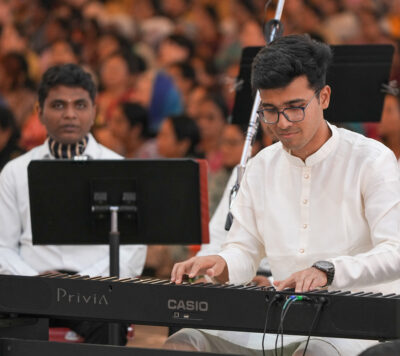
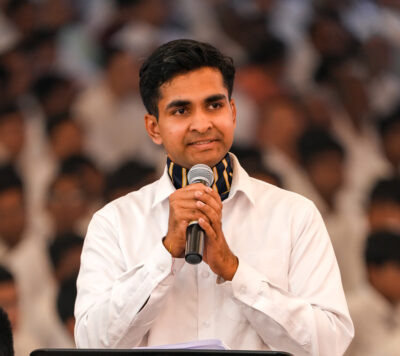
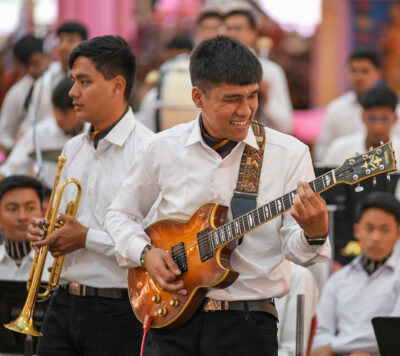
15 January | Cultural Presentation – SSSIHL Men’s Campuses
Bhakti Swaroopa Hanuman – A Drama Presentation
Through the life of Ramabhakta Hanuman, this evocative drama reflected the true spirit of Bhakti as lived devotion. Framed by a dialogue between a Sai student and his teacher, the presentation wove timeless episodes from Hanuman’s life with the inner journey of a modern seeker.
Beginning with the first physical encounter between Lord Rama and Hanuman, when the devotee who has long heard and imbibed the Lord’s name at last beholds His form, capturing the essence of Sravanam in that transition from listening to seeing, from longing to experiencing. Through the incidents that follow, the nine forms of devotion come alive not as abstract concepts but as intense, human moments in which God seems to depend on His devotee, and the devotee in turn finds his very identity in serving the Lord. The narrative culminates with Atma Nivedanam in the final conversation between Rama and Hanuman, gently suggesting what true devotion looks like: to live as an instrument, content to be where the Lord wants, as He wants, for as long as He wants, thus edifying that Atma Nivedanam is not a final moment of submission but an entire life of surrender.




Annual Sports & Cultural Meet of Sri Sathya Sai Educational Institutions to be held from 11-15 January, 2026
Sri Sathya Sai Educational Institutions will host the Annual Sports & Cultural Meet on, 11 January 2026 at the Sri Sathya Sai Hill View Stadium, Prasanthi Nilayam, Andhra Pradesh, India.
The Sri Sathya Sai Educational Institutions include all four campuses of Sri Sathya Sai Institute of Higher Learning, Sri Sathya Sai Higher Secondary School (Primary section, Girls wing and Boys wing), Smt. Eswaramma High School, and Sri Sathya Sai Institute of Higher Medical Sciences (SSSIHMS) College of Nursing and Allied Health Sciences.
Bringing together the spirit of a year-long journey of sports, cultural and fine arts competitions across our campuses, this event holds a cherished place in the collective hearts of our students and staff. More than 3,300 students will present inspiring physical and cultural performances in two sessions scheduled for the morning and evening. At its core, this celebration is a humble offering of love, shaped by the values of Duty, Discipline, and Dedication, to our most Revered Master and Founder Chancellor, Bhagawan Sri Sathya Sai Baba, as we joyfully mark His Birth Centenary Year.
From 12 to 15 January 2026, students from various campuses will present cultural programmes, including drama and devotional music, at Sai Kulwant Hall in Prasanthi Nilayam. The Prize Distribution Ceremony for the Annual Sports and Cultural Meet 2026 will be held on the morning of 15 January 2026, coinciding with the auspicious occasion of Makarasankranti, at Sai Kulwant Hall, Prasanthi Nilayam, Andhra Pradesh.
Annual Sports & Cultural Meet 2026 Schedule
The Sports Presentations on 11 January 2026 will be streamed live on the SSSIHL YouTube channel.
The Cultural Presentations from 12 to 15 January 2026 will be streamed live on the YouTube channel of Sri Sathya Sai Media Centre (SSSMC), Prasanthi Mandir Live.
Notes for Editors (About Sri Sathya Sai Institute of Higher Learning)
Sri Sathya Sai Institute of Higher Learning (SSSIHL), a Deemed to be University in Prasanthi Nilayam, Puttaparthi, Andhra Pradesh, India, is one of the few institutions in the world offering values-based education to students at the University level, ever since its inception in 1981. Ethics and morals form the undercurrent of every subject taught at the institute providing its students with a holistic framework of interpersonal development combined with academic excellence. With a merit-based, open admissions policy, SSSIHL welcomes students from all backgrounds—irrespective of income, religion, or region—and provides quality education free of charge.
SSSIHL has four campuses across Andhra Pradesh and Karnataka, attracting students from all over India and offering a range of programmes at the undergraduate, postgraduate, professional, and research levels.
SSSIHL also provides a strong research environment, with exceptional academic practices, that have resulted in the growth of national and international collaborations. The Central Research Instruments Facility (CRIF), based at the Prasanthi Nilayam Campus is one of the few facilities in the country that houses advanced Characterisation / Analytical Tools to carry out Translational Research in various areas of Science and Technology.
For further information, visit: sssihl.edu.in.
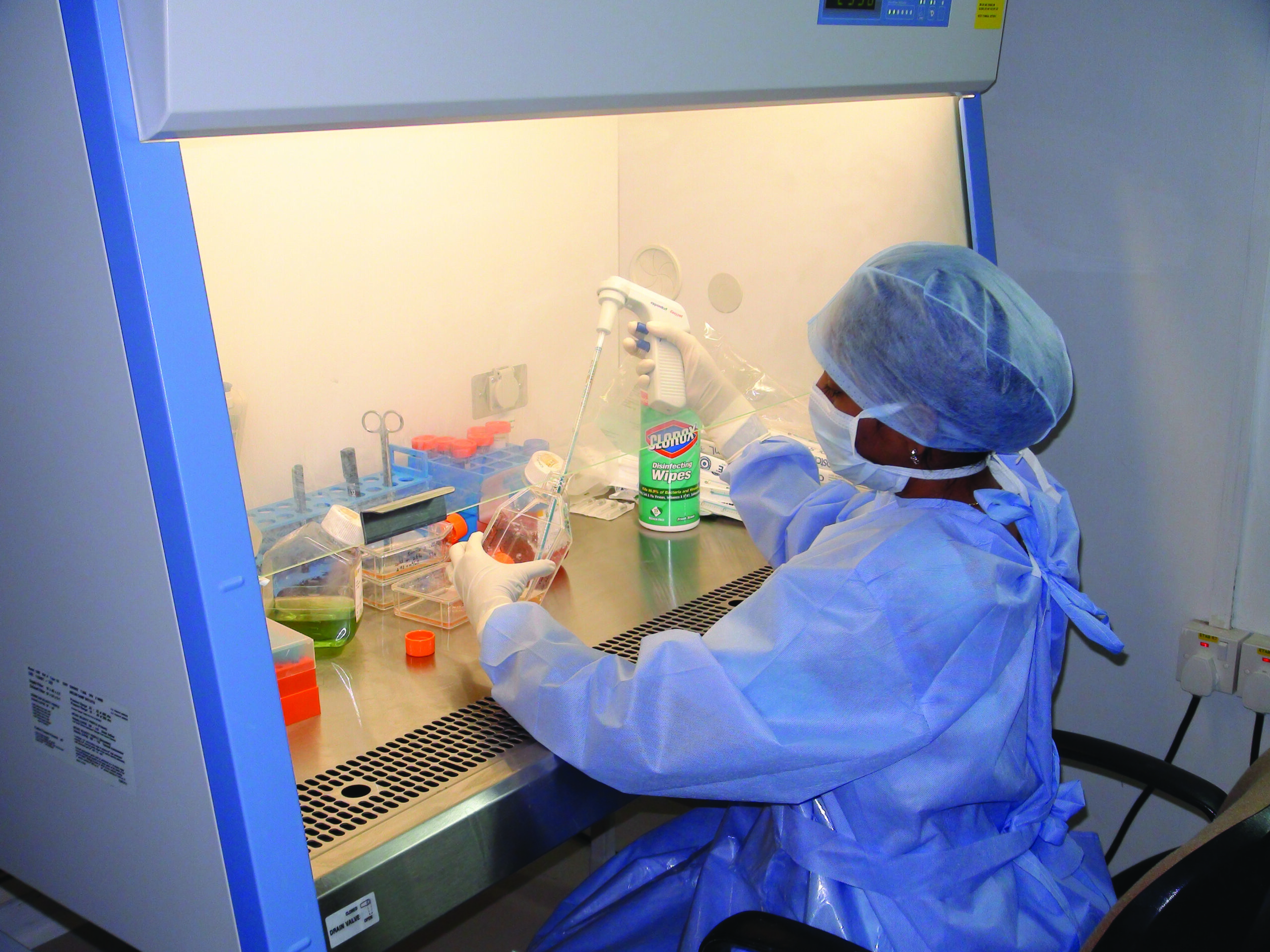
BIRAC Shortlists SSSIHL for Prestigious BioNEST Bioincubator Program
We are proud to announce that Sri Sathya Sai Institute of Higher Learning (SSSIHL) has been shortlisted by the Biotechnology Industry Research Assistance Council (BIRAC) for the prestigious BioNEST Bioincubator Program — a significant milestone in our journey toward advancing biotech innovation and entrepreneurship.
Building India’s Biotech Future from Andhra Pradesh
The BioNEST incubator will be established and operated by Sri Sathya Sai Research and Innovation Foundation (SSSRIF), our Section 8 not-for-profit entity. This initiative positions us to:
- Bridge the gap between cutting-edge research and real-world healthcare solutions
- Nurture promising biotech startups and innovators
- Catalyze translational research aligned with national priorities
- Demonstrate that world-class biotech innovation can thrive in Tier-2 locations
A Vision for Inclusive Innovation
This recognition reinforces our commitment to fostering inclusive biotech entrepreneurship that contributes to Atmanirbhar Bharat and aligns with the transformative BioE3 policy framework. We envision a future where groundbreaking discoveries in life sciences translate into tangible solutions for healthcare challenges.
We extend our heartfelt thanks to our advisors and mentors whose invaluable guidance and unwavering support have been instrumental in reaching this milestone. Their belief in our vision continues to inspire us.
Who can Participate? Aspiring entrepreneur in biotech, medtech, biopharma, or life sciences are invited to leverage this world-class incubation facility to transform your innovative ideas into impactful ventures. Whether you’re a researcher, startup founder, or innovator, the BioNEST incubator will offer:
- State-of-the-art infrastructure and laboratory facilities
- Mentorship from industry experts and academic leaders
- Access to funding opportunities and regulatory guidance
- A collaborative ecosystem to accelerate your journey from concept to commercialization
Your breakthrough idea deserves the right support. If you are keen to join us in shaping the future of healthcare and life sciences innovation, write to us at [email protected]
As we embark on this exciting journey, we remain committed to empowering innovators, advancing translational research, and contributing meaningfully to India’s biotech ecosystem.
Read MoreSSSIHL Partners with AQMATiCS for Quantum–AI Research and Innovation
Sri Sathya Sai Institute of Higher Learning (SSSIHL), Prasanthi Nilayam Campus, has entered into a five-year Collaboration Agreement with AQMATiCS Inc. on 27 December 2025, to jointly advance research, innovation, and capacity building at the intersection of Artificial Intelligence and Quantum Computing.
The agreement was formally exchanged between Prof. B. Raghavendra Prasad, Vice-Chancellor, SSSIHL, and Mr. Venkat Muramalla, Director, Partner Enablement, AQMATiCS.
Those present at the event included – Dr. Srikanth Khanna (Registrar, SSSIHL), Prof. Pallav Baruah (Dean, Innovation & Entrepreneurship), Dr. R Raghunatha Sarma, Director, Prasanthi Nilayam Campus, Dr. K Vijay Sai, Head, Dept. of Physics, Dr. N Uday Kiran, Head, Dept. of Mathematics and Computer Science, Dr. Kurmarao Tyada, Asst. Professor, and Dr. V N Ravi Kishore Vutukuri, Asst. Professor, from the Dept. of Mathematics and Computer Science and Mr Azhar Hussain, Lead Innovation and Delivery, AQMATiCS.
Key Highlights of the Agreement:
- Strategic Research Collaboration:
The partnership focuses on joint research in Quantum Computing, Artificial Intelligence, advanced algorithms, and emerging technologies, aimed at strengthening the Quantum-AI ecosystem and addressing real-world challenges across domains such as healthcare, cybersecurity, sustainability, logistics, and digital assets. - Joint Development of Platforms & Solutions:
Both institutions will collaborate on the development of advanced platforms, software applications, and demonstrable solutions. AQMATiCS will contribute industry expertise and resources, while SSSIHL will engage its faculty, researchers, and students through structured research, advisory roles, and internship programmes. - Creation of Joint Intellectual Property:
The collaboration enables the creation of jointly owned patents and intellectual property, with equal ownership. SSSIHL retains unrestricted rights to use such IP for its academic, teaching, training, and research purposes. - Structured Engagement through Statements of Work (SOWs):
All activities will be executed through mutually agreed Statements of Work, categorised as:- Product Research-Based SOWs (Quantum-AI research, algorithms, simulators, security and safety frameworks), and
- Application Development-Based SOWs (AI-driven applications, analytics solutions, chatbots, and use-case-specific systems).
Each SOW will define objectives, timelines, budgets, governance, and responsibilities.
- Establishment of Advanced Labs at SSSIHL: Subject to approval, AQMATiCS will support the establishment of specialised labs at SSSIHL, including:
- AQMATiCS QuantumRAiSE Labs (Quantum AI and Decentralised AI),
- AQMATiCS Talent Labs (student clubs and startup initiatives), and
- AQMATiCS iCollab (industry and international university collaborations).
All labs will remain under SSSIHL’s ownership and academic oversight.
- Curriculum, Internship & Training Support:
AQMATiCS will support curriculum enrichment through elective courses in emerging technologies and provide internship and training opportunities for SSSIHL students at SSSIHL and AQMATiCS facilities.
This collaboration reinforces SSSIHL’s commitment to values-based education combined with cutting-edge research, fostering innovation that is ethical, impactful, and aligned with societal needs.
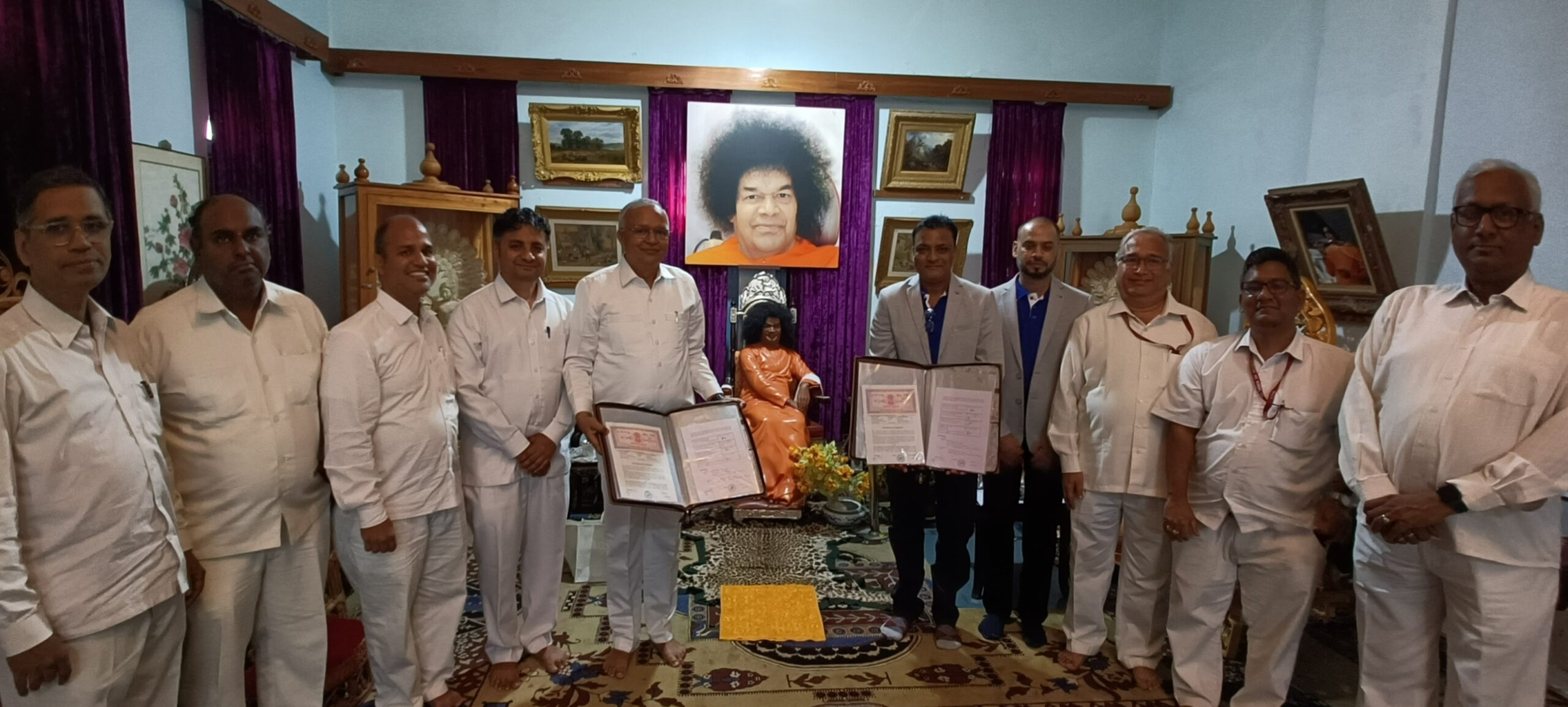
SPARKLAB 2.0 – Immersion Program & Valedictory Ceremony – A Report
SPARKLAB 2.0 successfully concluded at the Prasanthi Nilayam Campus, as a two-day (13-14 Dec), high-impact immersion program with a meaningful Valedictory Ceremony, marking the culmination of a journey that began on 18 August 2025.
Day 1 Highlights | 13 December 2025
The program commenced with invocatory Vedam chanting, setting a spiritual and purposeful tone. This was followed by a Welcome Address by Prof. Pallav Kumar Baruah, President, IIC-SSSIHL, who also introduced “Megathon: Sri Sathya Sai Innovation for Bharat”, a nationwide hackathon scheduled for February–April 2026. He highlighted Megathon’s vision of fostering grassroots innovation across India, with focus areas in Healthcare, Environment, and Energy.
The formal launch of Megathon was led by the Hon’ble Vice-Chancellor, Prof. B. Raghavendra Prasad, who underscored the expanding role of the SSSIHL alumni network in nurturing innovation-driven initiatives. He highlighted the collective support of alumni, industry experts, investors, and mentors in providing time, expertise, and resources, and reaffirmed SSSIHL’s commitment—through SPARKLAB and SSSRIF—to guide innovators from ideation to execution and beyond.
The afternoon session featured intensive one-to-one mentor–mentee sessions, offering targeted guidance on business models, market readiness, impact alignment, and pitch refinement.
Day 2 Highlights | 14 December 2025
The second day began with the Final Pitching Session for Investment and Evaluation, where 16 selected teams from SPARKLAB 2.0, SPARKLAB 1.0, and SSSRIF incubates presented their ideas before an expert evaluation panel. The session encouraged cross-cohort learning and exposed participants to diverse innovation approaches across sectors.
The Valedictory Ceremony, held in the afternoon, included:
- Invocation and Welcome
- Program highlights showcasing outcomes and impact
- Reflections shared by participants, mentors, and trainers
- Distribution of certificates to successful participants
- Expression of gratitude to mentors and trainers
- Valedictory Address by the Chief Guest, Mr. Murali Narasimhan
- Announcements on Megathon 2026 and upcoming Startup Day celebrations
- Divine Discourse
In his Valedictory Address, Chief Guest Mr. Murali Narasimhan stressed the importance of purpose-driven and service-oriented entrepreneurship, emphasizing that innovation must be rooted in ethics and societal needs, with financial success following naturally. He encouraged participants to remain passion-led, value-driven, and socially responsible as they build their ventures.
Dr. Swetha, Innovation Coordinator, IIC-SSSIHL, presented the highlights and statistics of SPARKLAB 2.0, noting that this year’s cohort comprised 45 participants selected from over 75 applicants, and emphasizing the program’s dual focus on tangible outcomes and holistic participant transformation through structured training and sustained mentorship.
An announcement on the upcoming Startup Day Celebrations (15–16 January 2026) was made by Dr. Sai Vinod, Assistant Professor, SSSIHL, inviting innovative poster submissions in the themes of Environment, Health, and Energy to showcase ethical, impactful, and scalable ideas.
During the feedback and reflection sessions, mentors and trainers appreciated the enthusiasm, discipline, and openness of participants, while students shared how SPARKLAB 2.0 significantly enhanced their clarity, confidence, and readiness to pursue real-world innovation challenges. The program was widely acknowledged as a holistic learning experience blending mentorship, ethics, and execution.
The program concluded with the Vote of Thanks and Mangala Aarthi.
SPARKLAB 2.0 emerged as a transformative immersion program bridging ideation and execution with purpose and values at its core.


